#while greg's version has on guitar
Explore tagged Tumblr posts
Text
REVIEW: Whirlybird - Dove is a Pidgeon
Dove is a Pigeon is the debut album by New York/Atlanta based band, Whirlybird.
The group consists of one Avery Milner who serves as lyricist, vocalist and plays guitar, as well as Matthew Hare on bass and PJ McFarlane who is (primarily) on lead guitar.
On this LP, Milner and the group work with long-time collaborator, Matt Mattson of Pendulum Studios, who takes charge of production, engineering and mixing. Finally, this record was mastered by Greg Hendler of Meadowlark Audioworks.
I first found out about this project back in 2020 as they performed as part of a charity live stream hosted by fellow New York/Atlanta based band, Lowertown (who you may recognise as former Dirty Hit signees). At that point, Whirlybird’s discography was fairly small, being comprised of one EP (Hot Flashes) and a series of covers and singles uploaded between Soundcloud and Bandcamp. The set was good, Milner showcased strong vocals and guitar work as well as perseverance through what I understood to be technical difficulties.
What particularly struck me during the set, however, was the newer works that were premiered - songs that later came to be known as “Borough Trash” and “New Bird Call”. In the weeks and months following this introduction, I delved deeper into the Whirlybird back catalogue, picking out new favourites in “Corner of k and 22nd” and “I’m green (ode to trees)” but all the while still humming the tune to Borough Trash as it soundtracked my own travels to and from the “suburbs”.
It would be another two years before we received a studio version of that song, and during that time, we were treated to a spattering of song ideas on TikTok (in a collection aptly titled “song yard”), a cover of Liz Phair’s “Flower”, two live recordings as part of the “Eat, Dog Eat!” Festival (June 2022) and finally, a short (but very sweet) set of demos titled “Carriage House Sessions”.
After that, we had the rollout to the album that I (soon!) will be reviewing today.
At 8 songs and 31 minutes, this LP is very tight - with little meandering into half-baked ideas, providing a concise showcase of what I believe to be a lot of potential.
We start with “New Bird Call” which, as I mentioned was premiered some time ago. This is a straightforward acoustic opener, both introducing us to, and highlighting Milner’s vocals, which have subtle, old-timey flavour. The tempo ebbs and flows as we move between sections, giving off a distinctly human feel.
What I really enjoyed about the studio version of this older track is that Milner and Mattson opt for a stripped back approach. The instinct in many cases would be to try and build this instrumental up, fleshing out the landscape with extraneous bells and whistles, but there’s a remarkable sense of restraint in the production choices - it’s very honest, and feels as though we can hear all the details of the room in which it was captured. There is even background chatter, which again bolsters the human quality of this song - and speaking of bells and whistles, there’s actually a solitary “bell” sound on this which punctuates the instrumental perfectly. Lyrically, this track sees Milner work in some beautiful poetic lines, with favourites of mine being “Warm wet rain fills my head, tossing, turning inside me” and “the weeping willow decides when tears will fall”.
On “Morning Do”, we pick up the pace a little, introducing shakers and drums. I liked Milner’s doubled vocals - a staple of alternative guitar music. My only gripe is that I felt it to be a little short, Milner does well to lyrically illustrate how time can often be felt to accelerate when around those we love (so perhaps that was the point of this track), though I would’ve wanted to linger in the moment a bit longer.
As I said earlier, “Borough Trash” has been one of my favourites since I first heard it. There's something about this one that feels bright and nostalgic (not in an overbearing way, though) and it never fails to put me in a better mood. The distortion on the guitar gives the track a nice sense of warmth and the panned slides make for some nice ear candy. In terms of the song’s musical progression, I’m a sucker for major-to-major movements on guitar, so when it goes from A to Am on the refrain/chorus I’m a very happy reviewer. I was grateful that they added the extended outro because it is my favourite part of the song and when the single version omitted it, I was slightly disappointed. Overall, this track is just a solid jam, and my favourite lyric must be "If time makes no sense, then spring forward and fall back again”.
“Reciprocity” was the last single dropped before release day. I really love the tempo shifts in this one - it initially took me out of the experience, but as I kept listening, it grew on me. Lyrically, there’s a real sense of proximity both emotionally and physically, with mentions of “sharing an orange”, “watching tv” and of course… being sick, which I think nicely communicates the depth of the connection Milner describes.
“Bridge under water” This one sees, Milner describe dealing with a flood in one’s residence. There’s a nice swing to this, almost as if we, the listener are bobbing in the water alongside Milner’s possessions. I’m loving the line “I brought a show dog to a gun fight” – suggesting that Milner (or the speaker of the song) was ill equipped to deal with the flood. I’m also a big wordplay fan, so the section that ends in “Water under the bridge” is highly enjoyable.
In the case of track 6, titled “Ghosts in the Garden” I feel as though this is sort of the spiritual successor to “Too Early” off Whirlybird’s first EP, the gurgling low-end on this number has an addictive quality to it, and I love the flashes of distorted guitar – hinting at a stormy, emotionally turbulent mood that contrasts nicely with the steadiness of Milner’s voice.
“Sidewalk” I heard this track as part of the “Eat, Dog Eat!” compilation tape that dropped in 2022. The guitars have an interesting ambling pattern, reminiscent of walking. I like the addition of tambourine and piano - its subtle, but effective, with the piano being so delicate that it but fleetingly catches your attention.
“Hunting song” is a wonderfully penned closer, Milner completes the throughline of bird references that suffuse the record with flying colours. I loved the line “I'll send the cat to go catch your tongue” and the way the instrumental explodes after “Now there’s a moment” is simply wonderful.
Whirlybird have come through with a very respectable record and I hope to hear more in the future!
Listen here:
Apple Music
Spotify
Youtube
#guitar music#new music#whirlybird#atlanta#new york#review#long reads#music#acoustic#indie folk#alternative rock#shoutout#bandcamp#youtube#spotify#apple music#Bandcamp
4 notes
·
View notes
Text
Oxbow Interview: Falsely Simple

Photo by Phil Sharp
BY JORDAN MAINZER
I get the sense that after all these years, the artistic collaboration among members of Oxbow is all but intuitive. The San Francisco experimental rock band, started as an offshoot from Palo Alto hardcore band Whipping Boy, has been making genre-averse noise music since 1989. Starting with the abrasive and bleak Fuckfest and culminating with the comparatively subdued and soulful Love's Holiday (Ipecac) released earlier this year, the Eugene Robinson-fronted band have developed an artistic voice over eight records that's cohesive in spirit and approach even if not always in sound. Whether they're working with no wave poets like Lydia Lunch, legendary vocalists like Marianne Faithfull, or full-on orchestras, Oxbow toys with space and raw emotion, focusing on the oft-uncomfortable relationship between silence and screams. All the while, Robinson sings about life, love, addiction, death, suicide, and violence, inspired by moments in his life but left ambiguous enough for listener interpretation.
Yet, it's that second in the list--love--that upon a surface listen, you might not hear on many Oxbow records. Sure, you can't really understand what Robinson is saying at all on early albums, let alone singing about. The band's longtime label Hydra Head did not, in their early pre-Internet days, send lyrics books along with the records themselves. But according to Robinson, love's always been a key component of Oxbow. What's new on Love's Holiday is the sonic and thematic clarity with which Robinson and the band dive in. "It's falsely simple sounding stuff," bassist Dan Adams told me over the phone earlier this year, "especially for people expecting Oxbow to be dirty and grimy and noisy." At the time of our conversation, before the album was released, Adams was unsure how fans and critics would receive it. It's gotten rave reviews from both per usual, and it seems like it could even be a gateway record for people not used to Oxbow or abrasive music in general.
The band put together and recorded the basic tracks for Love's Holiday just before the pandemic; they wouldn't see each other for a year and a half before returning to the record. During the pandemic, guitarist Niko Wenner suffered an injury, joblessness, and the death of multiple family members, including his father. He also had his second child. While Love's Holiday is by no means about these events or even directly inspired by them, you can hear the confused interplay between grief and joy throughout, as manifested by the instrumentation. Robinson's quintessentially pained bellows, Wenner's slurred blues guitars, and Greg Davis' pummeling drums rub elbows with elements with traditionally lighter timbres, like orchestral instrumentation and choral vocals. Kristin Hayter (fka Lingua Ignota) lends her voice to "Lovely Murk", embedding itself among Davis' deliberations, Adams' wiry bass, and shimmering synthesizers. A 15-person choir features on piano ballad "All Gone" and "Gunwale", the perfect juxtaposition to Robinson's baritone and Wenner's distortion, respectively. Don't get me wrong: Love's Holiday is an Oxbow album through and through, with a song like "The Second Talk" and its choppy rhythms and back-and-forth vocalizations reminiscent of back catalog highlights. But it feels like by being forthright, Robinson and company have become the truest versions of themselves.
Oxbow are in the middle of a West Coast tour celebrating Love's Holiday, playing San Francisco's Great American Music Hall tonight and finishing Sunday at Mohawk in Austin. When I spoke to Adams earlier this year, the band was rehearsing, figuring out how they'd adopt the songs to the stage. Their approach wasn't much different this time around: "Practice them a bunch, get on stage, and play them," Adams quipped. In reality, the challenge is stripping down the songs, "taking advantage of the space and sparsity," according to Adams. "It really is a fairly stripped down record in terms of what's going on," Adams said. In essence, they're doing to the studio recordings what Love's Holiday built on from previous Oxbow records: emphasizing the subtleties and the depth of Robinson's voice.
Below, read my conversation with Adams, edited for length and clarity.
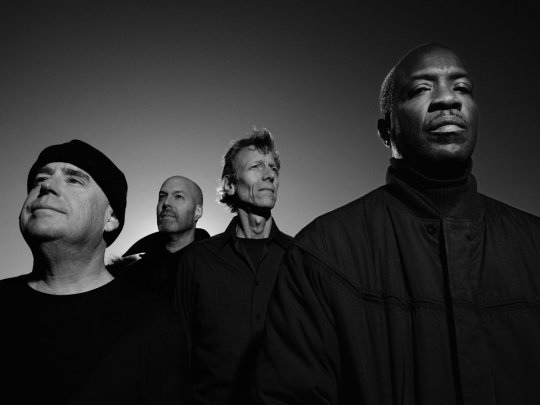
Since I Left You: How do you think Love's Holiday is unique as compared to your previous albums, and how do think it's a continuation of them?
Dan Adams: We were freer to give in to the sparsity and simplicity more than we have ever in the past. Yesterday, I listened to a couple of more recent records, and these are cleaner, simpler songs. One thing I really enjoy about that is they put the voice so far up front in terms of the quality of voice and the timbre and emotional content. It's much more exposed than the records have been in the past. I think that's a great thing.
It's very consistent with what we've done in terms of being a fairly transparent expression of emotional material. It's intense. It's complex, I guess, but...in ways that are much more subtle. It's a sensible trajectory from The Narcotic Story and Thin Black Duke. I don't think any of us in the band feel like our trajectories are a one-way pass. [laughs] I think we've always enjoyed doing what feels right at the time we made the music and following our whims and where we are in life, and so on. It's the music we were making at the time, as Niko was writing songs and we were hashing them out in the practice room. It's impossible to predict what the next round of material will be like, although in this particular session, we recorded a whole bunch more music at the same time, so we probably have another record using the material from the same process, which will also be pretty fun. Some of those songs are kind of similar, and some are very different even though they come from the same genesis.
SILY: Does the voice being more upfront on Love's Holiday place a greater emphasis on the lyrics?
DA: That's an interesting question. I think the lyrical content has always been extremely important and a driving factor. I also know Eugene has said quite a bit that he's intentionally written much less, much sparser lyrics for this record. In a way, you could say that's emphasizing what is there. On the other hand, I think it comes down to how the lyrics are delivered, and how well you can hear them. How clearly they're delivered by Eugene [and] how much space the band leaves for those lyrics. I think it's really up to the listener how much work they want to do to find out what the lyrics are about. In some of the older records, it was hard to figure out. In some cases, there were records that came out years before our lyrics books were published where people couldn't figure out what the lyrics were. In this case, they're both available and easier to hear.
SILY: In the lead up to the release of Love's Holiday, Eugene has talked about how the band has always written "love songs," so these themes shouldn't come as a surprise to anybody. But in the context of what you just said, that the lyrics in the past were less physically accessible, it might seem like a newfound theme to a lot of folks.
DA: Yes. I think that's right. Eugene's described it as trying to lay it out there and make it obvious after so many years of people not getting it. My interpretation is that because the music has at times been pretty strong, noisy, loud, big, and dissonant, things we've enjoyed and continue to enjoy folding into it, it's almost like typecasting. People hear that and assume that's the element being conveyed in the lyrics. There's complexity and subtlety. These are not simple topics, and Eugene [was frustrated] that people weren't doing the work to understand and find it. So this is a time to make it a little bit more obvious and tell people in advance what we're doing. That's what Thin Black Duke was about as well: short-circuiting people's assumptions about what our record was going to be like and explaining to people what we're doing rather than having people use the old simplistic interpretations of what we're about.
SILY: During the making of Love's Holiday, Niko had a child but also suffered the loss of multiple family members. Can you recall a time when something familial that has happened in a band member's life has contextualized a record as much as his life changes did for this one?
DA: I think so. We've been at this a long time. Everybody's had major things happening in their lives that have directly affected records. First marriages for several people before the seconds, kids at various stages showing up, parents dying, and so on. What's probably more important is how as everybody's gone through this and gotten older, we've interpreted [life events] as they come. Similar [events] might mean different things to you at different phases of your life. It's a continuum.
Certainly, if you hear Eugene talk about the first record, that was very much about very intense things going on in his life. That was part of the whole reason for the existence of the band. It shows where our heads are at the time: If we're in a different place, we're going to make different music.
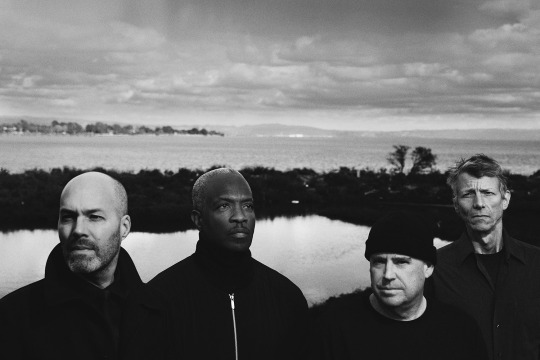
SILY: You've talked about how working with Joe Chiccarelli for the third record in a row has provided a consistency to allow you to be freer. Do you have specific examples of where the continuity allows for that freedom?
DA: We've felt the freedom to trust Joe more to make decisions and follow his lead. On the first record with him, there was a lot more tension. We weren't as comfortable relinquishing control of certain things. We've always had a pretty heavy hand on everything we make. It's been a great thing to allow what we make to be shaped more by his reaction to it, to allow him to be contributing ideas and getting the hell out of the control room and letting him do his thing. [laughs] He's learned a lot more about what we're about. For some reason, he's been very interested in what we do and very respectful of it. He's internalized it more and been able to take it and run with it. That doesn't mean he's written half the songs and done a whole bunch of stuff like a lot of producers do. If you listen to our rehearsal recordings as we've figured stuff out, it's fairly similar. But some of his little ideas about what sounds [good] here and what sounds [good] there, where to change the mix or drop a beat or cut a section out, he's got great sensibilities. We were very happy to follow his lead in a lot of cases.
SILY: At what point during the process did you decide to hone in on what I hear as one of the main sonic trends in the record, the choral singing?
DA: Our drummer Greg suggested we use voices instead of the orchestration we had been using on some of the earlier records. It was after a show we played at Supersonic Festival in Birmingham in 2017, where the promoters had talked with Niko and had the idea. They've always liked Oxbow doing special things for that festival. Niko had been thinking about choir stuff, and they asked us to put one together and perform with a choir. It was very difficult but very fun: a really great experience and interesting show. I think it made it clear that would be something very fun to explore. It wasn't a huge leap to decide to put choir back in the songs. It had been brewing for the past 4-5 years.
SILY: How did you come to work with Kristin Hayter on "Lovely Murk"?
DA: That's a good question. I don't know who got in touch with her or don't remember. Either Niko or Eugene, I think. [Maybe] Joe suggested it.
SILY: Were you aware of her before working with her?
DA: I was not. I find myself disappointingly out of touch with a lot of great music happening right now. I need new avenues to find this stuff. I don't search for music a lot on the Internet. When I explore, I usually listen to a couple really good local radio stations, but it's up to what they play and what I hear.
SILY: The band includes many instruments on "Dead Ahead" that contain interpersonal context or tributes to people that have since passed: instruments from loved ones who have passed, guitars Niko uses to play for his kids, even a toy piano you gave to Niko's kids. Were these inclusions a conscious starting point for that song, or was it something you decided on after the fact?
DA: I don't think there was any conscious thought. I'm guessing [Niko] was just playing around with it and happened to be using it at the time and went back to it. It's very consistent with how we've approached sounds we make: immediate inspiration, not too deeply thought out, grab something that's there because it seems like the right thing. If I had to guess--I'm interpreting how Niko works, since we haven't talked exclusively about this stuff ever--he envisions a lot of sounds in his head, sound qualities, timbre. He might be consciously aware there's a certain instrument he has in mind he wants to use, or it might be a subconscious thing to pick up the same instrument. He has a couple guitars he's had for years he still uses when playing in his house and working on new ideas. Nothing new there, I think.
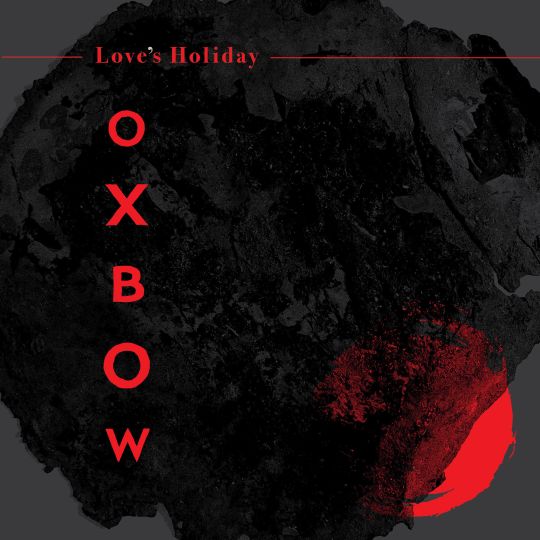
SILY: Can you talk about the visual identity of the record?
DA: It's been a great process. The last record was the first for which we made any videos, because it seemed like they were getting more important for how people consume and find music. In that case, we contacted a few people and basically said, "We'll buy you a plane ticket to come over, we don't have much other money to support it, but pitch us an idea, and if we like it, we'll make a video." That worked with the videos with Chris Purdie. This time around, Eugene or Niko--I can't remember--felt it would be important to make videos for everything. We needed to figure out how to do it without bankrupting ourselves more than we usually do. We sent enquiries out to a bunch of people and asked them to propose what they might do for songs, and if we thought there was a chance it would turn out well, we said, "You're on." We paid people what we could, which wasn't a lot, but we let the directors drive [the entirety of] the content. They're very different. As all of them come out, it will be apparent how different they are. It was a great experience to see people give us finished products that were really surprising. It's been a really wonderful added creative process to participate in, to get that kind of feedback from others to see their visions.
SILY: What about the cover art? Did you give Aaron Turner the same leeway?
DA: Yes. He's worked with us enough where he understands our process and is willing to keep us in the process. In this case, he developed quite a few proposals, and there was too much back and forth as we tried to settle on what we wanted to use. He was extremely patient. Sometimes, our process is convoluted, inefficient, and painful. But he hung in there and developed a bunch of ideas till there was something we all thought was cool. All of his ideas are great. He's a very broad thinker as a visual artist and comes up with great artwork. In this case, the variety in ways made it harder to choose, so it took us a long time to settle on one piece of art.
SILY: What's next for the band?
DA: Trying to stay alive and keep doing what we do. We're always working in the now even if the now is a span of five years. We're focusing on what's on our plates. There's no grand elaborate scheme for where it's all going to go. Time changes all of our lives enough between records that it's probably good that way. Following, rather than leading, I guess, is a good way to put that. Circumstances drive what we do rather than setting a path.
youtube
#oxbow#interviews#live picks#niko wenner#great american music hall#the regent#pub rock#mohawk#love's holiday#phil sharp#whipping boy#fuckfest#ipecac#lydia lunch#marianne faithfull#hydra head#dan adams#eugene robinson#greg davis#kristin hayer#lingua ignota#the narcotic story#thin black duke#Joe Chiccarelli#supersonic festival#chris purdie#aaron turner
2 notes
·
View notes
Text
B-MACK Speaks: New Music, Creative Processes, and Future Plans Hey boys, guess what… I had an opportunity to speak to the one and only Bruce Mack, the B-MACK!This male individual is really versatile and has multiple gifts or skills. I was happy to be able to talk to him after he released his latest funky tune “Duckgrease Burning at The Crabhouse. “ In this particular convo, Bruce was very much willing to share the meaning of his song as well as the creative process in this new track. As you would ask, it is a straight vibe!B-MACK distinctive vocal section complement each other so well with the soulful recording by MsLarayne. It is this soulful mix of funk, rhythm and blues that you will be dancing to. However, Bruce is not only a dope composer combined with the lead vocalist but a total maestro when it comes to sound production. With this attitude, he masterfully incorporates hip-hop, funk, soul, and R&B steadily into the album. It has been like that since B-MACK and his crew Michael cox on bass, Ben tyree on guitar, chris Eddleton on the drums, Leon gruenbaum on keys since their formation in the year 2017. They primarily take influence from greats such as Funkadelic and the late Charles Bradley. Bruce shared with me more about his whole journey into the world of creativity – starting from the young man who first witnessed the musical revolutions in Harlem and the Bronx and up to the present-day home studio experimenting in Staten Island. He is not only an amazing singer, his story is equally interesting, for real!You have to come with me to enter the fantastic world of B-MACK!Let's goooo! Listen to ‘Duckgrease Burning at The Crabhouse’ below https://open.spotify.com/track/3EqJNaVj6lUpURU62thKUM?go=1&sp_cid=bd24a14b968c0f6b344048ee4e7aabff&intent=addToLibrary&utm_source=embed_player_v&utm_medium=desktop&nd=1&dlsi=fa4c4ed776284865 Follow B-MACK on Facebook Twitter Soundcloud Bandcamp Youtube Instagram Tiktok What is your stage name B-MACK Is there a story behind your stage name? It’s actually the short version of my name (Bruce Mack) that became a nickname started by the late Greg Tate - founder of the band Burnt Sugar the Arkestra Chamber, which I’m also a contributing member of. I’ve always liked the sound of “B-MACK” as it feels simultaneously strong and joyful when I hear it. All the other band members followed suit, affectionately referring to me as B-Mack, so when I put the press release together for the recent singles I decided to relinquish using my full name and call the whole band “B-MACK”. It is more inclusive of the players as they contribute to the sound that is based around my songwriting & voice. Did it with all caps because the name is unpredictable as are the songs and I’m a big dude. Where do you find inspiration? I find inspiration in the observation of nature. I love camping, hiking and while doing so, I gaze at nature’ often making comparions to or how it applies itself to urban life. What was the role of music in the early years of your life? In my early years (1960’s-70’s), music was like a moderator for everything I witnessed going on in my neighborhoods (Harlem & the Bronx) and around the world such as the heroin epidemic, corrupt police, racism, Vietnam war, the assasinations of the Kennedy’s, Malcolm X, and MLK. Music provided a language that helped me understand it all and was therapuetic in learning that an artist could speak, sing and/or play out their social awareness. Are you from a musical or artistic family? I guess to some extent we were… there were six of us, four girls and two boys. The oldest - Emmajane has passed on leaving 3 older sibling - Florence, Delores, Walter and younger sister Lydia, all talented. Emma was a hair & make-up stylist, Delores & Florence could replicate and resize images from magazine onto a wall via drawing or painting. Walter loved singing as he does to this day in church and I often imitated him when he babysat me. But aside from Emma who had a career as a hairstylist, they never pursued careers in the arts.
Youngest sibling Lydia is a wonderful singer and went to Fiorello H. LaGuardia School of Performing Arts in New York City to do so. I always felt she was “the real deal” and remember being so impressed by her making it into that school, it is probably the most well respected performimng arts high school in NYC. She actually did pursue a career in music and invited to sing in one of her groups for a short period, but life as it can do took her in a different direction. But she did teach one of her daughters to sing and that happens to be LaRayne aka MsLaRayne who is featured on the bridge of Duckgreaser… I went to DeWitt Clinton H.S. at that time, a bit of a scatter-brain and torn between sports and music. But the vapors from my early love of music kept flowing around me… Our mother, Sallie Catherine Mack loved the performing arts, particularly dance and music, and in my formative years she always set aside time to address curiosities about what and who Lydia and I were listening to. I was a bit more curious being 3yrs older, so ‘Ma (as I called her) would tell me who the artist were and introduced me to who they were inspired by. That knowledge became important to my development in the business of music in later years and as an educator. Who inspired you to be a part of the music industry? Well, when you say “music industry” I think of the creative side as well as the business side… creatively I would say Sly&The Family Stone, business-wise I would say Tommy Boy Records. Tommy Boy was an independent record label based in NYC that made me feel empowered to create my own path to expose my writing and performing skills, which I eventually did with my good friend Kenneth A. Edmonds when we formed our own indie record labe Attic Sounds, in the mid-eighties, releasing an extended-length double-sided single ‘Chemical Pollution’ b/w ‘You Got Me’ with our band (the original) PBR Streetgang. How did you learn to sing/write/to play? I was inspired to sing by listening to recordings of Lambert Hendrix & Ross, King Pleasure, Betty Carter and other greats. I learned to sing by mimicking horn solos on James Brown recordings that featured Maceo Parker and Fred Wesley. After high school, I took voice lessons at the JazzMobile Workshop and then studdied classical voice in college. Writing came naturally to me because I connected it to abstract painting, which allowed me to put words&thoughts together in unconventional ways. This worked well for me being someone not well-read or knowledgeable with figures of speach, yet I’ve always been socially aware, historically informed, romantic with nature and empathetic. I’m also a student of Sly Stone, Joni Mitchell and Brenda Russell. I play several instruments… piano, electric bass, drumset and various percussion all self-taught. I generally acquired those skills when I would pick up an instrument attempting to create an ostinato or rhythm pattern because it would at least sound or feel like I had some ability. If it felt easy to be creative on, I would continue with it. I played around with piano and synths quite a bit because aside from it being great accompaniment with my voice, I could also convey feeling and/or the rhythm I wanted other players to capture. [caption id="attachment_55619" align="alignnone" width="2000"] I learned to sing by mimicking horn solos on James Brown recordings that featured Maceo Parker and Fred Wesley.[/caption] What was the first concert that you ever went to and who did you see perform? The P-Funk Earth Tour, 1976 at Madison Square Garden. The headliner was Parliament-Funkadelic with opening act Booty’s Rubber Band. How could you describe your music? Quirky original songs fused with an eclectic blend of edgy funk and rock. Describe your creative process. My creative process is more like a short manual of approaches. One approach very personal to me often starts with the rhythm of a melodic or lyrical phrase in my head that I’ve been repeatedly singing for days,
sometimes months at a time before dropping it on a rhythm track with chord changes in Logic Pro or GarageBand. Then I will start to layer it with other sounds or instruments I am hearing. Sometimes the ideas come to me as complete arrangements and or lyrics all at once! Which is fun because I then open up the recording software and work feverishly to capture the idea and feeling. This was the case with Duckgrease Burning at The Crabhouse. Another favorite approach is jamming or collaborating live with other musicians… I’ll bring a notepad of lyrics, and as we establish grooves we like…I’ll attempt to see which what lyrics or poem might fit, then I record the session with a handheld stereo (in case the idea is sonically sound and salvageable) device, take it home, drop it into one of the DAWs (digital audio workstation) and begin experimenting, doubling instruments, adding keys, vocals, etc.. What is your main inspiration? Nature. What musician do you admire most and why? Guitarist/composer/producer Vernon Reid. Because of his ability to instigate exploration and experimentation in any genre of music. To be that is beyond self-gratification because it is inclusive of all musicians involved in projects he is at the helm of or as a side contributor. Did your style evolve since the beginning of your career? Although my style has always centered around funk, it has evolved in that I now incorporate elements, concepts and genres of Afro-Caribbean, West Africa, South America and electronica. Who do you see as your main competitor? That’s an interesting and excellent question. I haven��t given it much thought, but if the late great Charles Bradley (R.I.P.) were alive… I would consider him my competition because of our closeness in vocal range, tone, how we apply our voices to song, similarity in genres and band instrumentation. Although his palette of meloncholy was much deeper. So who’s left? Hmmm…. I’ll have to say this fantastic artist based here in NYC called Blak Emoji. What are your interests outside of music? Cooking, hiking, camping, I love the outdoors! If it wasn't a music career, what would you be doing? I think I would be a forest ranger or something in that field - no pun intended. What is the biggest problem you have encountered in the journey of music? Although I have changed, it was my fear of trusting and giving 100% of myself to the music. Doing other jobs to earn money caused me to waste energy, which resulted in a lack of discipline to practice, which in turn made it stressful for me to work as a sideman because I had to put so much more in with short periods of time to get the music together for whatever gig I was on. If you could change one thing in the music industry, what would it be? Increase the royalty fees paid to artist by streaming platforms. https://open.spotify.com/artist/4laJvxjPZv91uVjkRj3bbf Why did you choose this as the title of this project? During the fall of 2023, I was cooking, testing different spices and temperatures to use for cooking Duck breast and rendering duck fat aka duck confit aka duckgrease, and found in all cases it came out well and was easy to do. So after a few bites, a couple glasses of wine, and some solo dancing in the kitchen… I started using the term “duckgrease” as a metaphor for making it easy to have a good time. I was having a moment and such a good time, It made me forget my woes and the state our country is in… Then I began to imagine there being a place for everyone to go enjoy themselves as well and sat down to write this mini tale of a fictitious getaway. Pure escapism. That’s why I called this project “Duckgrease Burning at The Crabhouse! What are your plans for the coming months? Plans for the coming months include recording new songs to combine with previous releases for a full length album that will include vinyl & CDs. The release of a concept video for Silent Witness, booking B-MACK band in venues, and get to the woods! Oh and one small thing… Come
August 9th & 10, I will be performing several songs with and conducting Burnt Sugar the Arkestra Chamber at Lincoln Center in a concert tribute to Melvin Van Peebles, directed by his son & film director Mario Van Peebles. Do you have any artistic collaboration plans Yes, producer Michael Cox and I are planning to do an album of electronica dance music with various singers and featured instrumentalists. Also looking forward to recording a duet with NYC Blues Hall of Fame bassist Pete Cummings in early summer. What message would you like to give to your fans? Thank you for indulging my work with your continuous support, and to keep yourself and children creative and uplifted with positivity during these complex times. When we all get pass the madness, there will be banana pudding waiting for us at the ‘Crabhouse! One Love.
#Interviews#BMACK#BMACKdropsDuckgreaseBurningatTheCrabhouse#BMACKDuckgreaseBurningatTheCrabhouse#BMACKoutwithDuckgreaseBurningatTheCrabhouse#BMACKreleasesDuckgreaseBurningatTheCrabhouse#BMACKwithDuckgreaseBurningatTheCrabhouse#DuckgreaseBurningatTheCrabhouse#DuckgreaseBurningatTheCrabhouseBMACK#DuckgreaseBurningatTheCrabhousebyBMACK#DuckgreaseBurningatTheCrabhousefromBMACK
0 notes
Text
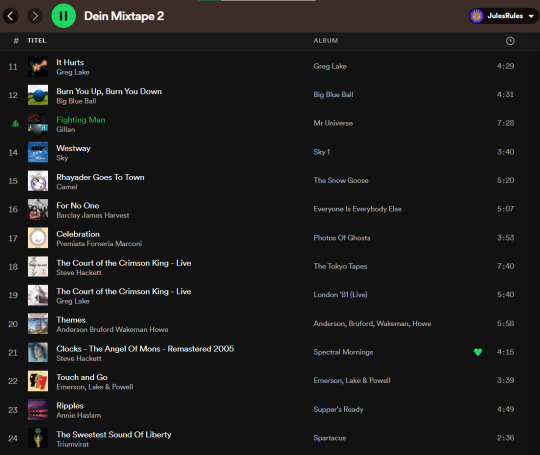
Now this is what differentiates Spotify's AI from a human DJ... imagine putting that together intentionally as a playlist. Lol. But it's kinda interesting!
#prog#prog rock#progressive rock#steve's version is sung by#john wetton#who was one of the successors of#greg lake#king crimson#while greg's version has on guitar#gary moore#really interesting combinations of artists#greg's voice sounds more right to me#and gary's guitar adds an edge#but i don't care for greg's alternate vocal melody on the chorus#it's still the more interesting rendition#steve and john just do a carbon copy of the original#but i guess it's ok#since they also had#ian mcdonald#on stage#music#rock music#classic rock#live music
3 notes
·
View notes
Photo

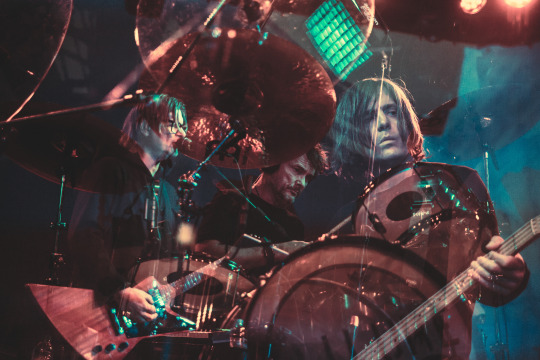
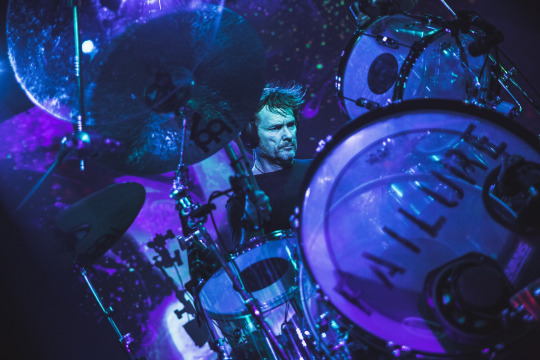
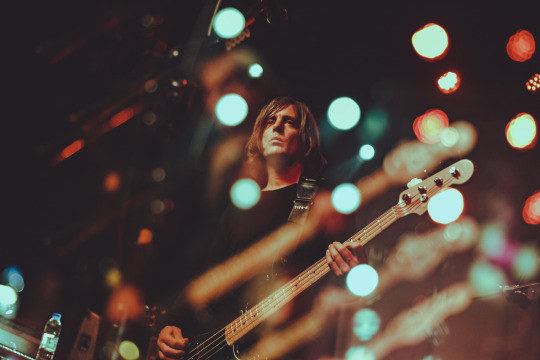






Failure The Sinclair, Cambridge, MA 25 June 2022 Click below to read all about the show!
It’s Failure and a movie in Boston and across America as the legendary space-rock artists cross the continent in support of their latest record, Wild Type Droid. With the 25-year anniversary of the seminal Fantastic Planet having arrived during the pandemic, it’s their first excursion in wake of the milestone, and the occasion has spawned a documentary film, due in 2023, that focuses on the band’s living legacy. A truncated, 30-minute edit of the doc plays before Failure takes the stage on each night of this tour, and the pared-down version focuses on interviews with actors, comedians, and of course other musicians who found themselves drawn to the band’s singular sound. There’s some unsurprising faces in the doc, including Tommy Lee and Maynard James Keenan, but also a few more left-field appearances such as Jason Schwartzman and Hayley Williams of Paramore, the latter of whom describes receiving a burnt copy of Fantastic Planet from a future bandmate when they were high school students. The film also highlights how, through sheer individuality, the band beat the curse of the comeback record when they reemerged after a fifteen-year hiatus with The Heart Is a Monster, picking up where they left off as if the better part of two decades hadn’t passed in the interim.
After that brief taste of the film, there’s time for one more interlude before the band arrives, and, perhaps surprisingly, it’s a projection of the Ren and Stimpy episode, ‘Space Madness’. The band have always had a sense of humor about their perennial fascination with the cosmic; even on Fantastic Planet they were already titling tracks like ‘Another Space Song’ in self-aware acknowledgment of their obsession. But while the film regaled us with stories of the past, the baker’s dozen songs in the band’s main set centered primarily on Wild Type Droid, including an unlikely seamless segue from Ren and Stimpy into ‘Submarines’. Like nearly all of the band’s discography, you won’t find WTD on Spotify – the band was one of many high-profile expats from the platform in the wake of controversy surrounding the company’s inaction on vaccine misinformation, taking a principled position on an issue that directly affects musicians’ ability to keep touring safely.
While once a four-piece including A Perfect Circle guitarist Troy van Leeuwen, since their reformation in 2014 Failure have perhaps become the platonic embodiment of a power trio. It’s become nigh impossible to envision Failure as anything other than the union of Ken Andrews, Greg Edwards, and Kellii Scott, each a multi-faceted and virtuosic player in their own right. Through their collaboration they have always triangulated the iconic Failure sound across the years, like finding a signal among the stars, as much an act of divination as it is one of creation. Few bands play so deftly with the occasional detuned guitar and vocal as Failure. While many a fan of the band was probably introduced to Fantastic Planet by way of A Perfect Circle’s high-profile cover of ‘The Nurse Who Loved Me’, upon listening to the original you’ll notice little deflections in the chords that Keenan and company smoothed out. While Keenan’s gorgeous delivery would probably score higher with a vocal instructor, alternating the two and highlighting the differences in Andrews’ vocal, as well as the guitar track, slowly reveals the true genius of the original.
The band’s unique dynamic also makes it so hard to pick a favorite album of theirs; while hardly a necessary exercise, it can be fun – and I’d wager Failure fans run one of the widest temporal gamuts when it comes to their favorites. Fantastic Planet looms large in the hearts and eardrums of many, but any of their three post-resurgence albums delights with how they each skirt the border between the band’s evergreen songwriting techniques and modern sonic advancements. Keen to acknowledge the quarter-century of FP before the night concludes, the band returns to the stage after their encore break to play a sequence of tracks therefrom, an absolute hit parade that moves from the iconic ‘Nurse’, through the huge power riffs of ‘Stuck on You’, into the interminable groove of ‘Heliotropic’, and finally concludes in the haunting final refrain of ‘Daylight’. Andrews holds out a finger and traces the outline of the room as the final chord fades into the air, and each of the band members lingers a bit and waves to the eager crowd, visibly humbled by and grateful to each of the folks who’s helped pack the room at The Sinclair for the evening. Be they newcomers or fans of nearly 30 years, whether they arrived with Wild Type Droid or the first notes of Comfort, it’s safe to say that listening to Failure has shifted each attendee’s musical journey for the better.
22 notes
·
View notes
Photo

Live on Instagram, Rebecca Sugar and Ben Levin (with help from Ian Jones-Quartey) have given us a two-hour fundraiser to benefit the Trevor Project, in honor of Bi+ Awareness Week.
It was a lovely evening hanging out with them. Please see below for a little breakdown of what songs they played and what was discussed during the stream in terms of bi+ youth resources, Rebecca’s experiences, and the importance of having support for bi+ people.

Please go to The Trevor Project and learn more about what they do and how you can help. Their Resources for Bi+ Youth packet is available on the site! You can also donate through Rebecca’s specific fundraiser.
More below:
Rebecca announces this event is for Bi+ Awareness week for the Trevor Project. Ian Jones-Quartey is giving some help with the fundraiser in the background.
First Rebecca plays "Love Like You" on guitar. It's a lovely stripped down version. They're a little bashful about making a couple glitches on the guitar. It's very sweet and charming, Rebecca, no one minds. :)

Next Ben Levin joins on bass and they play "Fries," a longer version than was in the Adventure Time show.
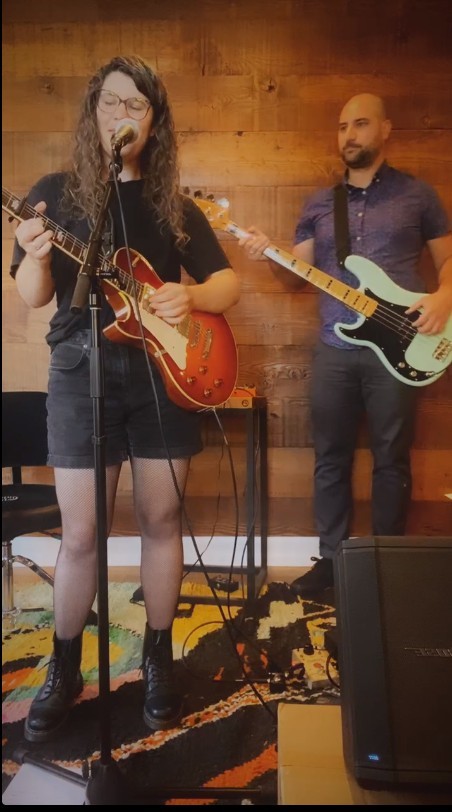
Then Rebecca talks about the Trevor Project and its suicide hotline that they provide for the LGBTQIA+ youth they support. After some tech glitches, they discuss how great Trevor is and what resources and research they provide on why it's so important to support these communities. Since this is Bi+ Awareness Week, they have put together a resource guide. They encourage us to donate to this organization.
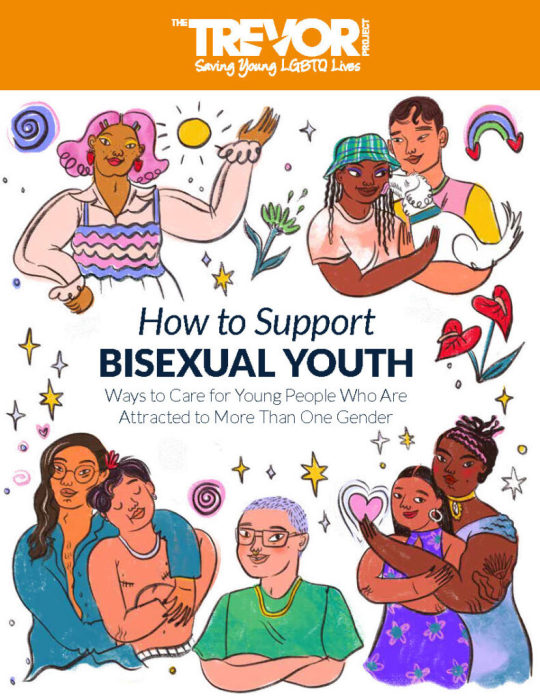
Rebecca discusses Ben Levin's involvement on Steven Universe and Craig of the Creek. They decide to play Jeff Rosenstock's song "Illegal Fireworks and Hiding Bottles in the Sand" as a mashup with the Craig of the Creek ending song.

Then they give an update on the donation amounts and Rebecca gets so excited about the support. They admit to being really nervous after no performances for so long.
Rebecca decides to play a solo song and doesn't announce the title at first but Steven Universe fans all know "Escapism." It's a slightly different version with some great guitar additions in an added interlude, and they even throw in some fun super-high squeaky notes at the end.
They give a shoutout to Jeff Liu for the beautiful guitar part. They tell a story about Adam Muto (who worked on "Escapism" with Joe and was Rebecca's board partner on Adventure Time), and how he asked Rebecca to write a song for the Adventure Time finale. Rebecca goes on to play "Time Adventure."
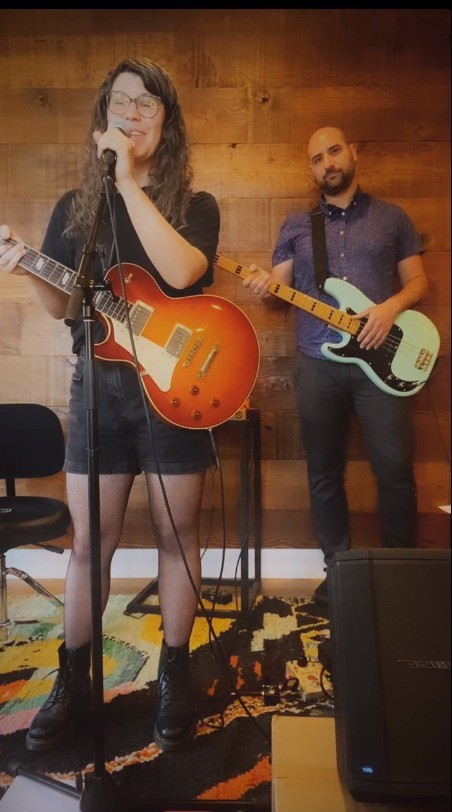
Then they bring Ben back to do the bass while Rebecca sings "I'm Just Your Problem." Rebecca does a cool guitar solo in the middle while Ben rocks on the bass.

Then they do a nice little instrument switch and bring in the omnichord and set up "True Kinda Love." They shout out Chance the Rapper, aivi and surasshu, and of course Estelle for the help writing this song.

Rebecca gets excited again about the amount of people who have donated and gives us info about the hotline for the Trevor Project, how their hotline is available for phone, chat, and text. They also point out the existence of Trevor Project's available pamphlet, which can help people understand their Bi+ friends and family, as well as helping actually Bi+ people understand how they can expect to be treated, how to understand themselves, and that they aren't defined by their partner.
Rebecca then takes a moment to set up with an acoustic guitar (so they can have their foot on a box since they don't have a strap) and they cut out briefly to get it organized. Then they do indeed come back with their foot on box.
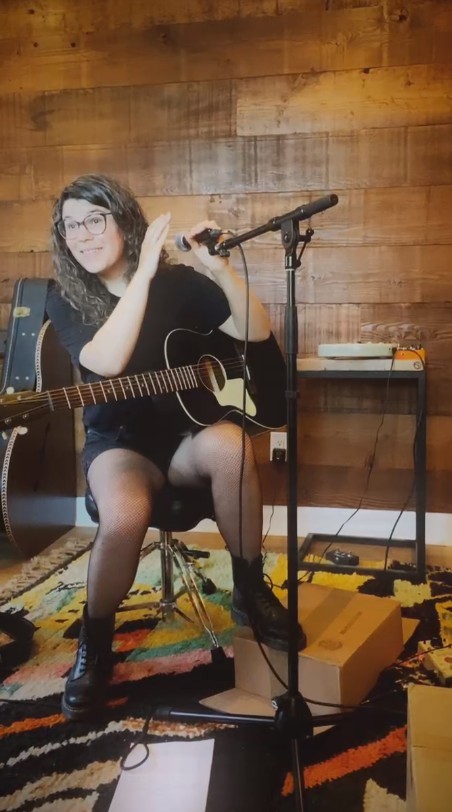
With a shoutout to Kate Micucci (who is watching on Instagram Live), Rebecca says she will play "a Lars and Sadie song" that she's figuring out on guitar, and plays "Be Wherever You Are."
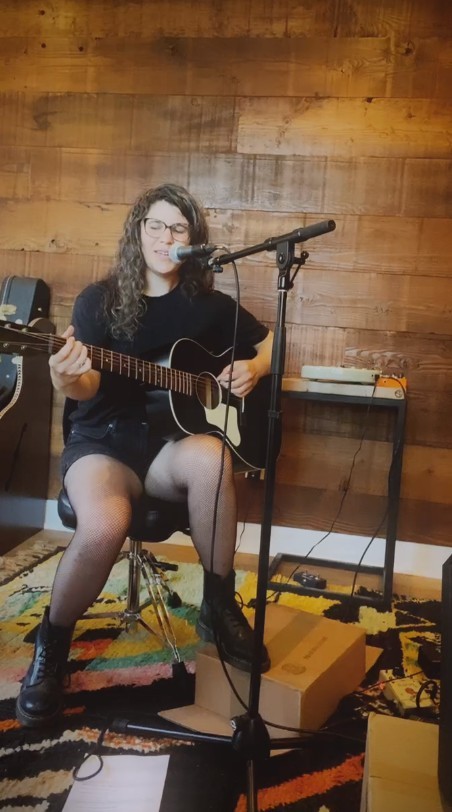
Rebecca goes back to getting excited about the donation amount and they can't believe it's as high as it is with the concert less than half over! They say they'd like to make a tradition of doing a Bi+ Awareness Week fundraiser every year. She didn't have access to information that Trevor is now providing to bi youth when she was growing up in the 2000s, and thinks their resources are so vital. She suggests using their resources yourself or that you slip the resources to people in your life who want to support (or need to know more about how to support) bi youth.
Rebecca says they're about to play a "really really hard" song that they're nevertheless excited to go for. They said maybe we can guess what it is. They shout out Nick DeMayo, who's in the audience, the animation director of Steven Universe who is Greg's namesake and taught them a lot about music. And then they jump into . . . a guitar and bass version of "Other Friends"!

They shout out aivi and surasshu, Jeff Liu, and Sarah Stiles for all their contributions to that song, and how cool it is to play a "campfire version" of the song even though it's different.
Next, she wants to play a solo (but will need Ben again right after!) but takes a moment to thank everyone in attendance for supporting the stream and the Trevor Project. They say "thank you for bearing with me" regarding the performance rockiness.
They talk about Marceline and how they felt so connected to this character--writing episodes like "What Was Missing" where Marceline would be revealed to have had a relationship with Bubblegum and be known to be a bi character, and Rebecca felt so astonished that the audience understood Marceline was bi and understood she would always be bi, not fluctuating in orientation based on current relationships defining her. Rebecca explored this about herself only after she saw it explored with Marceline, and understood it was so important to have media that helps people understand who a bi person might be. She never related to the "party person" or extrovert stereotype of bi people as they’re usually shown in media, and thought as a nerdy person who was shy, she couldn't be bi if that was true. Cartoons helped her connect with people who understood those things about Marceline and eventually about herself.
Trevor is so important as an organization to help the next generation understand all of this. Rebecca has felt that knowing herself wasn't possible if she didn't understand her bisexuality or accept it as what it is, and it spread instability throughout the rest of her life. What brought her to finally being able to process and understand this aspect of her identity was cartoons, and she hopes cartoons can bring some others in as well. With that, she brings out the song she was asked to write for Marceline even though she had left the show. Rebecca plays "Everything Stays."

Rebecca then says they were a little conflicted about whether they were going to say all that stuff, about why this issue is personal to them. (It's okay, Rebecca, this is the best!!!)
She says that song was about her stuffed black rabbit that was her favorite toy that she thought she loved so much, but she forgot it in the garden and it was damaged. That it was so surprising to her that she could have loved this rabbit the way she did and not realize it was missing, and that it could change without her. "Everything Stays" was obviously about that, but she also says the situation with Spinel was inspired by the same toy. She switches to electric guitar to sing and play "Drift Away" with Ben back on board on bass.

They point out that they're rocketing through the set list and Ian suggests maybe they'll have to do some encores. In thinking about what songs to play, they point out that so many songs were written about their mental health journey and coming out to family and friends. A song that was "at the end of that whole arc" for Rebecca was "Change Your Mind." It can go on forever, they point out, but they'll only play it a few times. On we go with a really smooth guitar version of "Change Your Mind." (It's the extended looping version.)

They announce that now with the Instagram contributions and the landing page we've reached the goal of $20,000, and they can't believe it's at the halfway point of the stream and we have already reached it despite that the show's been done for a long time and they "broke a lot of social media rules" by stepping away for so long, but that's been crucial to their mental health and their journey.
After they come back from a break, they discuss some funny artifacts that they finally got to take home that were left in the office--a Steven Universe piñata that they were supposed to smash in celebration of a pickup and they didn't want to because, you know, hitting a representation of their younger brother is kinda wack? Haha.

They also had a model of Marceline's bass.
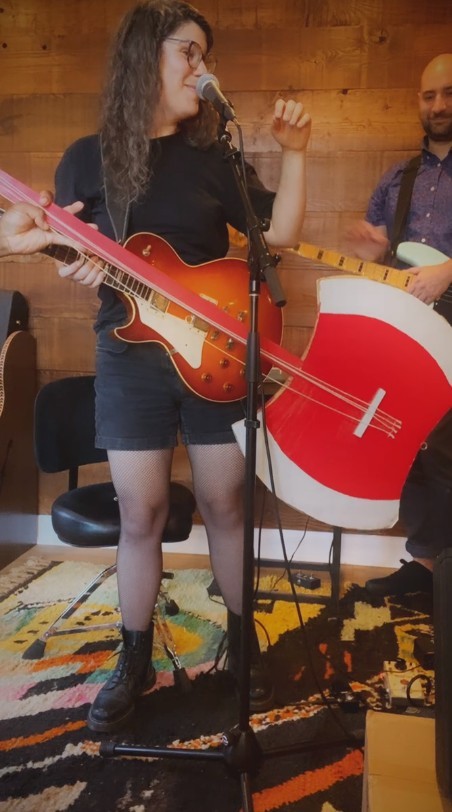
These items were left in the office and just kind of frozen in time because Rebecca's last day (written on the white board, still, when they returned!) was March 13, 2020, just as the pandemic was coming down. Returning to collect stuff was like visiting a room that had been frozen in time!
Rebecca offers a stretch goal to get to $30,000 instead of the original $20,000, and talks a little more about the Trevor Project, discussing how important representation has been, to have bi representation in terms of DIRECT support for LGBTQ+ youth. What they've gotten to do with cartoon representation, having queer characters who can just have fun the way heteronormative kids can and see representatives of themselves is great, but these specific resources are also so important.
Rebecca then plays "Heart of the Country," a Paul McCartney song they're learning that has a hard solo they hope they'll nail. After playing it, they say they flubbed some of it but it was super fun.

Rebecca comes out with an old ukulele--older than the one they wrote the Steven theme song on and auctioned off for National Bailout--that they wrote a bunch of Adventure Time songs and got as a Hanukkah present. (They mention happy 5782 for those of us who celebrate Rosh Hashanah.) Ben is also using his first bass! They recommend musical instruments as gifts for bi people because those are the gifts that keep on giving! They mention working on guitar during the lockdown (which has been therapeutic!) and not having played uke in a while because of that. With that, she dives into "Here Comes a Thought."

They decide to talk about the background of "Mindful Education," how they were coming out at the time they were writing that episode and song. They said coming out was like having the ground spin around. They thought mindful meditation, being so wonderful and helpful, could become an 11-minute episode where Steven leads kids in mindful meditation. With help from Ben (and Matt Burnett), Rebecca realized it would work better if they show characters benefiting from the lessons. They have a little joke about how the episode number was 108 and they prided themselves on knowing the episode numbers. Then they put aside the uke and pick up a big black guitar to play "Found."
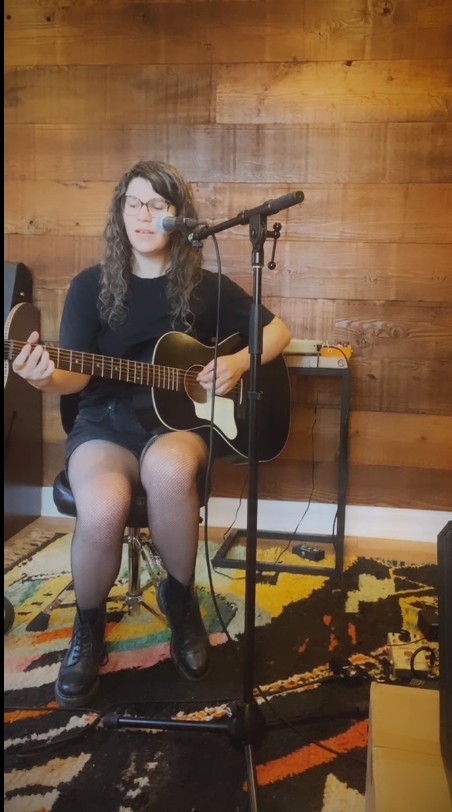
After this, she talks more about Trevor Project's hotline, chat, text, and resources. They remind us that bi+ people experience very specific forms of marginalization and this organization can help everyone who wants to understand. She thanks everyone for helping with donations and she can't believe the Instagram fundraiser has gotten to $10,000. She's amazed that "the thermometer is bursting" and promises to draw it later. Ben thinks he could be part of future fundraisers and Rebecca reminisces about times they've played together, like in 2016 at SDCC and a Gallery Nucleus show.
Rebecca goes back to the other guitar to do some audience requests for repeat songs and talks about the song "Fries." The story behind this one, when she was writing it--the first song she wrote for television and the first episode she boarded--since she was introverted and struggled with pitching, she went on the roof of Cartoon Network to practice being louder until she was actually audible. Ian helped.

They decide to do the ending Craig song again and Ben says Jeff Rosenstock's song is really nice and Rebecca talks about getting teary over the Craig ending with people sitting around the dinner table. Rebecca's favorite line is "speaking in a stupid secret language." She feels like she still hasn't moved on from that in her life and likes to surround herself with people who speak that language. After it's over, Rebecca says hi to Jeff Rosenstock in the chat.
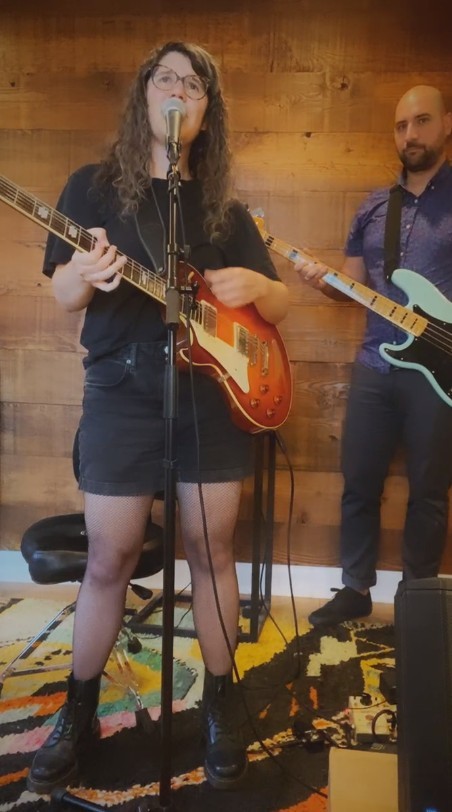
They do more shoutouts for the Trevor Project and then discuss encore songs. Rebecca decides to do "Love Like You" again because they were sad they messed up a chord during the first performance. It's another lovely version.
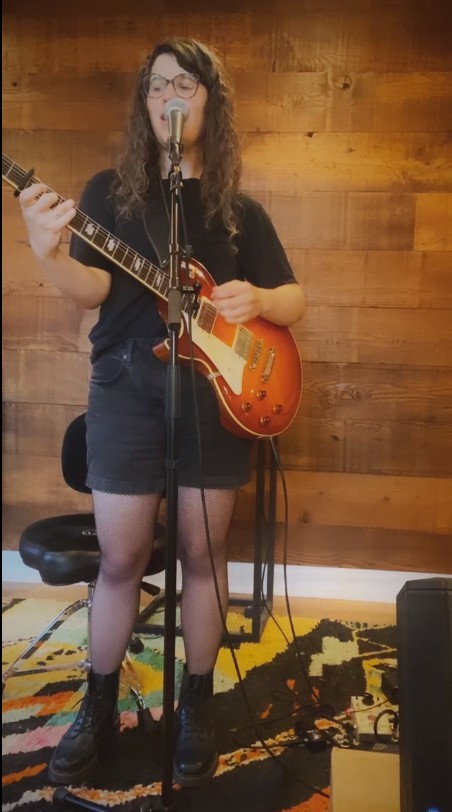
After more great discussion of the Trevor Project's resources and Bi+ Awareness Week, Rebecca says hi to her Brazilian friends and how awesome it was to visit there for a convention, and she loves that Trevor is trying to expand resources to be more global. She knows how important those resources would be to help people worldwide. She thanks people for coming out to see her, and admits to being surprised that her life has come to include actual performances since she always thought she'd just be behind a desk as an animator. She gets very nervous about performing but loves that people support her. They love being able to perform and once got a sweet comment from John DiMaggio (the voice of Jake on Adventure Time) who would hear the early demos that were a struggle to be audible, and he told her that she's come so far that it now sounds like she enjoys performing, enjoys the sound of her own voice now. She feels that coming out and all the support from friends, family, and organizations has made that confidence and comfort with herself possible.
With that, Rebecca plays the Steven Universe theme song on guitar!
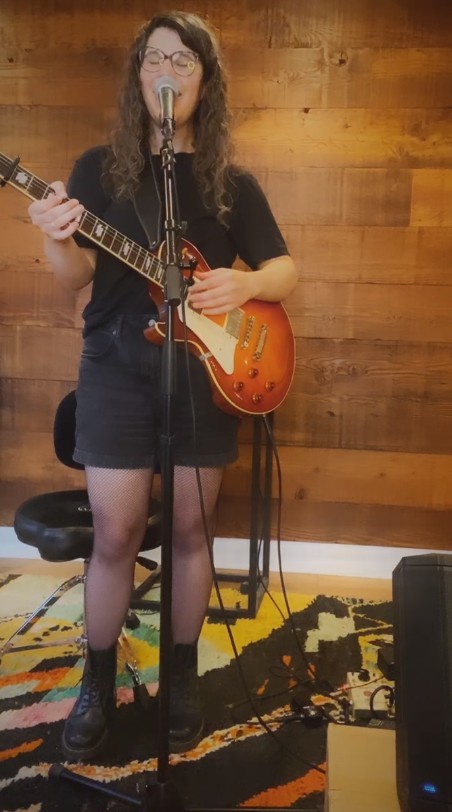
And then, they play "Time Adventure" again.

Rebecca talks more about the astounding amount of support for Bi+ Awareness Week, how moving it is and how hard it is to hold it together while talking about what it was like to be an adult who didn't know if they were even allowed to be bisexual and nonbinary, how much of their adult life was in such a quagmire over not knowing fully who they were.
For their next to last song, they play a song written by aivi and surasshu with lyrics by Rebecca: "Being Human" from the ending theme of Steven Universe Future.
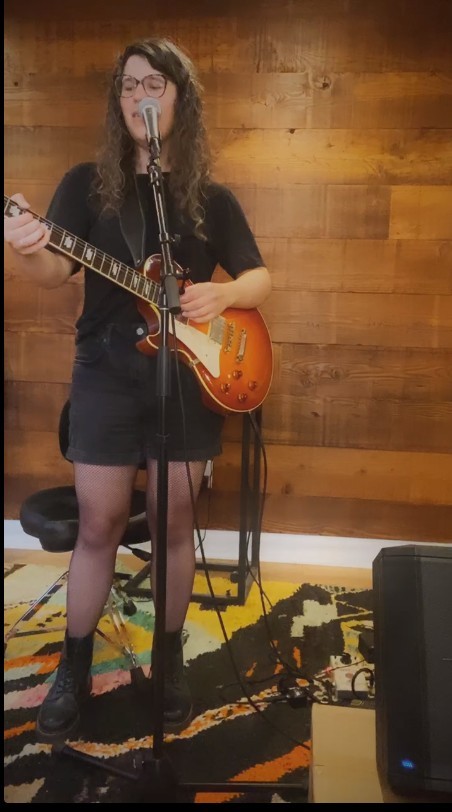
Finally, Rebecca says thank you to everyone who's been involved in the songs--the performers, aivi and surasshu, Jeff Ball, the Crew, Ben Levin, Ian Jones-Quartey--and everyone who's helped raise over $11,000 just through the Instagram concert. She plays "Change Your Mind" one more time, adding that the journey is ongoing even though this song was written at a time she considers at the end of an arc of self-discovery for her.

Thank you!
(Yes, I did a donation.)

Links:
https://www.thetrevorproject.org/
https://www.thetrevorproject.org/resources/how-to-support-bisexual-youth/
#rebecca sugar#steven universe#adventure time#the trevor project#ben levin#craig of the creek#myblog
51 notes
·
View notes
Text
Ranking of the Easy to Hard Greg Lake (with ELP) songs to play on guitar. {That no one asked for}
7. Lend Your Love To Me Tonight [Easy peasy. Lovely selection of chords and a very simple but Greg-ish strumming. But, you know... the lyrics of this one]
6. Lucky Man [This one is tricky. Ia actually particularly easy if you are doing the live versions which is his signature strumming pattern but it gets complicated if you want to do the studio version since they are all arpeggios. But overall is one of the simplest.]
5. Closer To Believing [Okay maybe the guitar is not so predominant in this track but there is a lovely arpeggio going on that is very Greg-ish. I believe is a 12 string guitar. The arpeggio by just hearing it I can tell that is not so simple but at the same time it is.]
4. Watching Over You [Okay, after crying over this song I come to realize that is a complex arpeggio but is repetitive, so, once you get to master it, becomes easier. The only thing that can be difficult to master is a little bass walk that he does in the 6th string while keep playing the arpeggio when he sings the second 'Watching Over You' The nice thing about this one is the strumming section after the arpeggio and that is when the song becomes easy. Again... the lyrics.]
3. From The Beginning [Well, it can be mastered with time. Is not that easy but also is not that difficult. It does requires skill but the good thing about Greg Lake songs is that you learn the required skill for playing the song BY ACTUALLY PLAYING the song. So, the key thing is the intro, then the verses repeat]
2. Still You Turn Me On. [This, I can tell by experience, is hard. This shit is hard. And more hard if you want to sing as you play like he does. The song is full arpeggios, using the hybrid picking (which is just using your free fingers to pick the strings on the strumming hand) and the signature Greg Lake picking (which is hum... picking the strings all in downstrokes first and then he goes up using alternating picking which is up and down in different strings, like you do a down stroke in one string and in the next to do an up stroke.) IT IS MORE EASY than my explanation I swear.
The whole thing with Still You Turn Me On is the perfect picking. He just doesn't miss a note. The melody is perfect and once you learn the beautiful chords and memorize each finger position it gets so addictive to play.]
1. The Sage [Pretty obvious, huh? I can't actually give you a full opinion on this one because I haven't started to learn it yet BUT I can tell you why I put it in the first place.
The chords that he is using are quite unusual and some of them are open (which mean that it has strings open, not being pressed) and that means you will need to mute some open strings with the flesh of the fingers and that is difficult to do. The other thing about The Sage is true perfect timing between the voice and the guitar, you need the vocals to play The Sage or you will get lost. Then the fast hybrid picking in the improvised solo and the dynamic (which I think is most important part) There are parts that he plays softly but without lowering his intensity and then he plays louder and softly again going back and forth with the volume of his playing. The same happens with the vocals.
Is the same principle of his signature picking for the arpeggios.
Honesty, it is a lovely tune to play on guitar once you have master it. It can take sometime, yes, but that is a challenge that pushes you to learn the song.]
12 notes
·
View notes
Link
A year ago, the guitar was in dire straits. With songs like Travis Scott’s “Sicko Mode,” Ariana Grande’s “7 Rings,” Lizzo’s “Truth Hurts” and Panic! At the Disco’s “High Hopes” among the most consumed of 2019, programmed beats and horns were the sonic flavors of popular music. Sure, there were outliers — the Jonas Brothers’ “Sucker,” Maroon 5’s “Memories” and Post Malone’s “Circles” among them — but as the rock and alternative genres embraced artists like Billie Eilish, whose innovative music made the traditional band approach feel outdated, the days of chords and solos seemed numbered if not headed towards irrelevance.
Then came the coronavirus pandemic and things changed. Forced to perform from home or in rooms not intended for live music during lockdown, many artists went back to basics and out came the trusty six-string. For iHeartRadio’s “Living Room Concert for America” in March, Foo Fighters’ Dave Grohl played an acoustic Guild on “My Hero”; Billie Joe Armstrong from Green Day strummed to his band’s “Boulevard of Broken Dreams”; and even Eilish, with her collaborator brother Finneas, sang her hit “Bad Guy” accompanied by only a Fender acoustic. Other benefit livestreams like Global Citizen’s “One World Together At Home” event saw the Rolling Stones, Keith Urban and Shawn Mendes strip down their hit songs for unplugged versions. And in April, Miley Cyrus delivered an emotional cover of Pink Floyd’s “Wish You Were Here” on “Saturday Night Live” with Andrew Watt, himself a COVID survivor, on guitar.
At the same time, there was an electric guitar solo being heard on one of the most-played songs in the United States. Harry Styles’ “Adore You,” which has logged 1.1 million radio spins in 2020, according to Mediabase, and has been streamed more than 400 million times, per Alpha Data, features the playing of Kid Harpoon (real name: Tom Hull), Styles’ friend and producer, who handled the guitar parts for much of the Brit’s excellent “Fine Line” album, released in Dec. 2019. As it turns out, the melody of the solo, which also serves as the bridge to “Adore You,” was first hummed by Styles for Hull to emulate. “I did it with my mouth into a microphone,” Styles told Variety in October. “And then Tom sent me this video trying to get it to sound the same. He spent a couple of hours getting it.”
Why include a guitar solo when most pop songs would never dare? “I feel it’s kind of like ‘La La Land’ saving jazz — only for rock ‘n’ roll,” Styles cracked when posed with the question. But more seriously speaking, Variety‘s Hitmaker of the Year added: “I’m not a spearheader of the movement, like, ‘Let’s bring back guitars.’ There’s plenty of times when [a song] doesn’t sound better with a guitar, and you don’t use it. But a lot of the references I grew up with have guitars; and it’s the first instrument I played, so it makes sense that I would like the sound of them more. I don’t think the guitar is dying. Guitars are great and always have been.”
In fact, guitar sales in 2020 have been robust. Music retailer Sweetwater reports more than 50% year-over-year growth in guitar purchases, with even larger increases during the peak COVID months of April, May and June “when customers most likely hunkered down to practice and create music after watching all of the streaming video they could handle,” according to a rep for the Indiana-based company.
The spike extended to other string instruments as well, which saw growth of more than 70% year-over-year in the price range of $299 or lower. The metric indicates that “new players are joining the fold,” says Sweetwater, which has been in business for over four decades and operates online. (Competitor Guitar Center, with more than 250 physical locations in the U.S., did not fare as well, filing for Chapter 11 bankruptcy protection last month.)
Even in the virtual world, learning to play an instrument has taken off during lockdown. The platform Yousician, which provides interactive learning for guitar, bass, ukulele, piano and voice, currently reigns as the No. 1 app for music instruction while its sister product, GuitarTuna, is tops for guitar tuning.
Ask current writers and producers working in pop and hip-hop about their process and you soon learn that an acoustic guitar is often the beginning or the essence of a hit song. Among Variety‘s 2020 Hitmakers, the trio of Taz Taylor, Charlie Handsome and KC Supreme credited a guitar loop as the foundation for Trevor Daniel’s “Falling.” For Maren Morris’ “The Bones,” producer Greg Kurstin noted: “The first thing I noticed was Jimmy Robbins’ guitar hook; I wanted to keep the song rooted in that.”
“So many hit songs from 2020 started with a acoustic or electric guitar, whether it be a melody line or simple progression,” says songwriter and producer Jenna Andrews, whose recent credits include BTS’ “Dynamite” and Benee’s “Supalonely.”
And often, those guitar-based foundations remained through the finished product — for instance, 24KGoldn’s “Mood,” with its impossibly catchy sun-kissed guitar riff, and Powfu’s “death bed (coffee for your head).”
“I know it sounds kinda old school, but I love it when a well-recorded acoustic pops off on the radio,” says Sam Hollander, whose hits include the aforementioned “High Hopes” and Fitz and the Tantrums’ “HandClap.” “The bulk of my songs tend to be born on guitar. Without that foundation, the lyrics and melodies never really emote the heartbeat and emotion that I’m trying to dial in. There’s just a general warmth to it that’s hard to replicate. It’s like the warmest chocolate chip cookie.”
“I think the prevalence of guitar in 2020 has a lot to do with hip-hop producers using more emo and punk-rock influences,” offers Angie Pagano, whose AMP management company represents Tommy Brown (Ariana Grande, Blackpink) and Mr. Franks, among others. “Juice Wrld really helped bring this into the mainstream over the last few years. We’re seeing a great blend of emo and trap these days.”
Indeed, the year’s most-consumed hits leaned hip-hop — Roddy Ricch’s “The Box” landed at No. 1 on the Hitmakers list with Future and Drake, Jack Harlow and Megan Thee Stallion in the Top 10 — but even DaBaby’s “Rockstar,” the No. 3 song of the year, referenced a guitar in its chorus, albeit alongside mention of a Glock pistol. That visual may go against what Hollander calls “the Kumbaya vibe of the guitar,” but the song still features an acoustic strum at its core.
In the case of Styles’ 2020 successes, which also include the ubiquitous “Watermelon Sugar,” his producer further explained that, while aware of what was reacting on the charts at the time they were recording, Styles wasn’t about to chase the trends. Said Tom Hull: “We [thought], we can’t play the commercial game in terms of what’s happening right now. What we can do is make music that really resonates with us. There’s no blueprint. You just have faith. We love records from the ’70s and ’80s; weird prog rock music that might be a seven-minute instrumental; then you’re listening to Shania Twain, like, ‘This is awesome, too.’ The goal was to make something we will always love, and if it completely flops commercially, at least we know we love it. We have that.”
103 notes
·
View notes
Text
“BLACK MIDI, NEW ROAD” CHRISTMAS EXTRAVAGANZA! AT THE WINDMILL, BRIXTON (19/12/19) – LIVE REVIEW - Jimmy McCormac

‘SOLD OUT. Please don’t even ask’ is pasted on the ramshackle door of The Windmill. It is packed. Innumerable print outs of christmas songs litter the stage. Every ‘BM’ chord is written in bold. A nod to Black Midi’s ‘BmBmBm’. There is a real homeliness to the venue. Not at every gig do you see a man and his dog sitting at the bar.
Opening up, Wood plays a low key solo set. He’s sat on a bar stool with his guitar playing slowed down doo wop. He delivers lyrics about how he “stripped out his insides” telling someone “he loved them in front of Black Midi”. His legs are trembling along to his nervous shudder of a voice that goes in and out of a yodelling type falsetto. Although brief it was an intimate, theatrical moment of brilliance. The guest live.
Following a short break, an insane, progressive jazz jam is formed. The only few absences come from Ellery and Kelvin. A real shame. Especially when Kelvin was in the audience (only making a very brief appearance). Nevertheless the group still deliver. Sounding a bit like Miles Davis electric period mixed with King Crimson. Evans sax playing is in free form ‘Bitches Brew’ and ‘On The Corner’ style. To the point where he had to stop for a coughing fit. While Kershaw’s keys are very reminiscent to its predecessor, ‘In A Silent Way’. The other members play in tones not unalike John Mclaughlin, Johnny Sharrock and Greg Lake. The members jumped off each others energy. Wayne and Simpson play mind altering rush hour traffic drums. Both fighting bits of the streamer backdrop off their bodies. At one point Wood throws his guitar down to become a conductor. He raises his arms convulsively up and down. In response Simpson and Wayne deliver dynamic shifts in tempo.
The members interchange with some dangerous leaps from stage monitors to get their pint fix. One streamline jump from Simpson made me question if he trained for the olympics. The substituting members somehow carry the jam forward seamlessly. Their devoured bottles of becks are now smashed, lining the front row of the audience. The pint glasses from band members and audience alike are piled up shrinelike on the speakers.
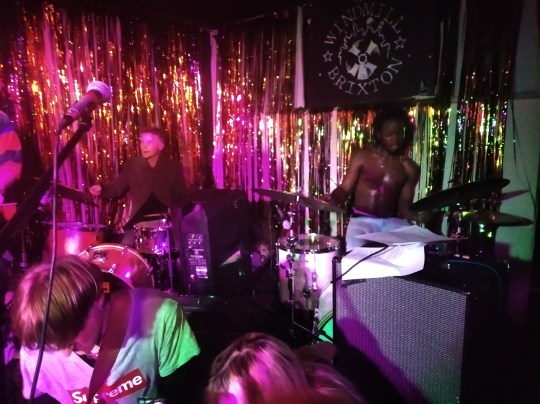
Mid way through the set Greep leaps behind the drum kit while Wayne gets a pint. He grabs the mic and shouts “For one night and one night only. Geordie Greep on drums!” as if he is some kind of circus announcer. Wood makes a secondary announcement for those at the back. Greep delivers a collected drum solo alongside Simpson. This soon turns into a wild solo. While he does this he never removes his winter coat. Nuts.
In a third set the group play some festivities. A few eyebrow raisers in the mix. The band deliver their own version of Fontaines DC ‘Boys In The Better Land’. They replace ‘the better land’ with ‘the christmas hats’. I suppose this gives them an excuse to cover it. Vocals are switched between Wood and Greep as they commemorate their label mates. Speedy Wundergrounds Dan Carey stands next to me open mouthed. He quotes it as “fucking amazing”. Greep delivers bluesy licks teasing his later ‘Christmas Blues’. A piece where he puts on his best Robert Johnson impression. Another set highlight.
They play BCNR’s ‘Sunglasses’ and Black Midi’s ‘Ducter’, replacing the lyrics with ridiculous festive ones. ‘I am invincible in this christmas hat!” for example. Between a beer flying moshpit, a monitor convulses violently half way from the stage into the front row. It is saved milliseconds before a deafening floor smash by good samaritan audience members.
Covers of ‘Last Christmas’, ‘Mary’s Boy Child’, ‘We Wish You A Merry Christmas’ and other festive classics are performed to finish the set. Picton takes the lead on many of these, ending up in a humorous falsetto on ‘All I Want For Christmas Is You’. Hereby Morgan struggles to keep his composure. He’s in a fit of laughter. Greep starts an alienistic ramble. “Christmas, christmas. Geordie! It’s been said many times, many ways! Merry Christmas oo-ee. Black Midi. Black Country New Road. Sponsored by The Windmill”.
Following the set everyone converges for drinks. The band members and fans discuss everything from business deals to Scott Walker. A fan goes round with his polaroid camera taking pictures with everyone he meets, and many leave the venue in festive spirit.
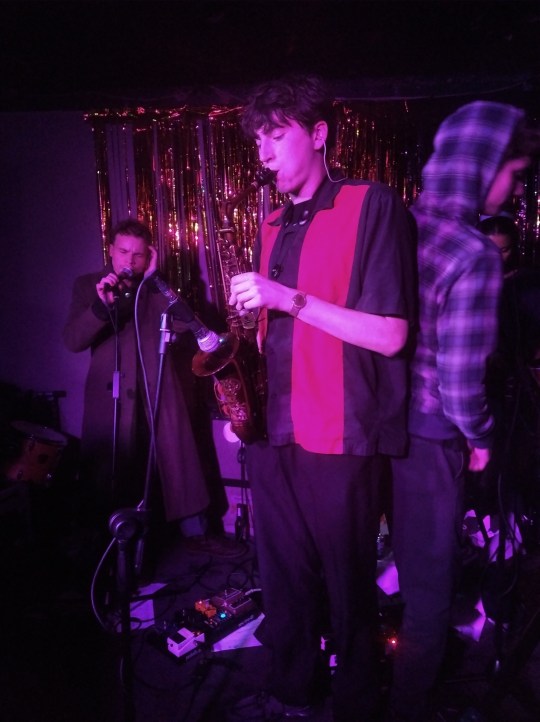
3 pints later Picton sets up a drum machine and macbook, Greep a microphone. They introduce themselves as ‘DJ Dairy and MC Spritz’. The most bonkers freestyle is performed over popular instrumentals. “Lets go lets go! Change the beat yo” Greep shrieks. He goes on to ask the audience questions. “Who would win, Tyson Fury or Mahammid Ali?”. Without a chance to respond he answers ‘Mahammid Ali’. He takes fast shots of straight whiskey.
This is followed by inviting fans up to ‘freestyle’. Over these ‘freestyles’ remarks are made from the pair. Somewhat alike to DJs over dodgy bootleg records. ‘Lets Go Motherfucker. Lucas from Manchester’ , ‘Anthony Joshua! Anthony Joshua’. Picton is waving his hands in the air rollercoaster style and they both sing fragmented versions of Kanye West songs.
Later Wayne staggers on stage and him, Greep and Picton form a trio of out of tune drunk singing. The song is ‘Goodbye Yellow Brick Road’ by Elton John. Greep and Wayne share a microphone. They have their arms around each other and swing backwards and forwards. Following suit are May and Kershaw (now in the audience), their pints clutched between their hands.
In the early hours of the morning a fan has collapsed on a sofa in the back room needing his friends to lift him up. Another fan lights a cigarette inside the venue, getting in an argument with a woman at the bar. Then there’s me. I missed the last tube and ended up in an abandoned old bank. No further questions. I present to you a normal night at The Windmill.
youtube
Web archive link: https://web.archive.org/web/20210819205610/https://newsoundsmag.co.uk/2019/12/23/black-midi-new-road-christmas-extravaganza-at-the-windmill-brixton-19-12-19-review/
13 notes
·
View notes
Text
Earth.
~~~
"What's your favorite thing about Earth?" Five year old Steven Universe asked his father one afternoon, watching Greg pick idly at his guitar.
Greg was a little surprised at the question, chuckling. "Feelin philosophical today, Schtu-ball?"
Steven shrugged, casting his eyes down to his tiny ukelele as he plucked in tune with his father.
Greg hummed and pressed his lips together, thinking. As he thought, his eyes drifted to his new copy of Kerry Moonbeam, the remastered 2000s version that wasn't quite the original but still held the same charm. He smiled, and looked back at his son.
"Music," He answered fondly. "I don't beleive my life would have been the same without it."
☆
What's your favorite thing about Earth?" Seven year old Steven Universe asked Pearl while watching her train on the beach, swinging her spear with all the grace of a trained dancer. He didn't see the gems very much, so he was sort of shy talking to them at all, let alone asking them questions, but Pearl seemed to take interest in his query, pausing to hold the spear upright in front of her face and think for a moment.
"There are many things I admire about this planet," She answered at last. "I wouldn't have settled here if it had no redeeming qualities."
"What's your favorite?" Steven cocked his head, giving her his baby eyes until she relented.
"Flowers." Pearl sighed. She got a bit of a faraway look in her eyes, and she even seemed to smile. "A Rose can only grow so beautifully on a planet like Earth."
☆
"What's your favorite thing about Earth?" Nine year old Steven Universe asked Garnet while she carried beams of wood up to the temple, finishing up Steven's brand new home at long last. They'd move in the furniture next week after the plumbing was sorted out. Steven was elated, but he tried to seem professional around the gems. Mostly around Garnet, though. She was so mysterious.
As he scuttled up the stairs behind her, she stopped, shapeshifted an extra hand, and picked him up, plopping her on top of her head. He giggled and grabbed her hair as she started walking again, a keen, knowing look on her face.
"Love," Garnet replied, simple and easy. Her visor seemed to flash two different colors then, red and blue. "Love."
☆
"What's your favorite thing about Earth?" Eleven year old Steven Universe asked Amethyst on one of their runs to the Big Donut. After Steven dug out two donuts for himself, Amethyst downed the rest of them, bag and all, in one entire gulp. She burped loudly, and Steven laughed loudly in response.
"Hmm," She tapped her chin, sticking out her tongue. "My favorite. Thing. About. The. Earth. Eh?"
Steven nodded. Amethyst snorted and jabbed a finger into Steven's side so that he let out a tickled squeal. They both laughed.
"Fun." Amethyst crossed her arms behind her head casually, as though it were the most obvious answer in the world. "What's life if you ain't having a lil fun?"
☆
"What's your favorite thing about Earth?" Thirteen year old Steven Universe asked Connie Maheswaran, looking at her sideways on the picnic blanket, watching her read. She looked up in surprise, her eyes seeming much bigger behind the lenses of her glasses. She frowned a bit as she thought, gnawing at her lip, until finally, she lit up.
"Knowledge!" She leaned forward enthusiastically, grinning with all her teeth. She looked so pretty when she was excited. "Earth has such a big and complex story to tell! From the highest mountain to the deepest ocean, all its geology and biology and chemistry-- there's so much it can teach us! So much to do and see!!" She sighed. "One day, Steven, I'm going to see it all."
☆
"What's your favorite thing about Earth?" Fourteen year old Steven Universe asked Bismuth, setting up folding chairs. With Garnet's wedding mere hours away and Bismuth's debubbling mere hours before, it seemed only appropriate to get to know her better before... well, whatever happened next. There was so much he never got to ask her, especially since they weren't really able to talk much last time.
Bismuth clicked her tongue, stopping to tie her colorful dreds up in a ponytail.
"Endurance." She said at last. "This planet's been put through the wringer time and time again. The kindergartens, the war, the cluster. But she always endures. She bounces right back, greener and brighter than ever." Bismuth looked out at the sun over the sea. "What a spunky little planet Earth turned out to be."
☆
"My favorite thing about Earth?" Peridot turned to give fifteen year old Steven Universe a grin, pulling something from her gem. When it formed in her cradled hands, Steven had to lean forward to see it, small and fragile, handled with the utmost care.
Peridot held the small potted plant up to his face, brandishing the tiny sprout like it was her very own newborn child.
"Life." She whispered excitedly. "Like technology, but organic! A network without wires or gears. This plant. Animals. Humans. You!" She poked him in the forehead. "So strange. So enticing... the magic of living and growing."
☆
"Change." Answered Lapis Lazuli, gazing out over the horizon from the top of the lighthouse.
Steven reclined against the shingles, arms behind his head, listening as Lapis spoke again. "You told me once that nothing ever 'stays' on Earth. That everything is always moving, changing. On Homeworld, you had one job; one purpose you were created for, that you would fulfill for thousands and thousands of years, and nothing would ever ever change-- but here!"
She stretched her arms out, feeling the wind across her skin.
"Everything moves forward."
☆
Jasper didn't seem to like him very much.
Maybe it had something to do with the fact that Steven dismantled everything she's ever known, throwing thousands of years of loyal service as a soldier into the grinder. And now he was out here expecting her to teach him to control his powers? It was surprising enough she was actually going through with it, but expecting her to make conversation? That was pushing it.
In any case, sixteen year old Steven Universe sat across from her campfire, working up the nerve to ask her anyway. After all, there had to be a reason she didn't leave this planet; especially when she had a whole universe waiting for her just a galaxy warp away.
"What's your favorite thing about Earth?" He asked it so offhandedly, he didn't think she'd give him a proper answer. Favorite? Yeah right. Maybe she had her reasons to stay but she certainly didn't seem to harbor any love for this planet.
She reacted about as well as Steven expected; a sneer on her face and a glare in her eyes. He began desperately trying to decide how to take the words back when suddenly, unexpectedly, Jasper answered, "Rain."
Steven paused, his mouth still open. Jasper avoided looking at his face, tossing another log into the flames. The light flickered across the facets of her gem.
"I like the smell of it." She mumbled. "That's all."
☆
"My favorite thing about Earth?" Spinel asked curiously, swinging from the low hanging branch of one of Homeworld's brand new trees. As amazing as it was that Homeworld was able to support plant life, Steven was just happy to see how much the gems were enjoying it, too. Spinel herself seemed to particularly enjoy the jungle-gym potential of it all, scampering along the canopies like an excited monkey.
"Yeah!" Steven floated up to join her in the branches. She sat upright so she could sit next to him on the limb. "I know you were only there for a day, but I was wondering if there was anything you found special about it?"
Spinel snorted. "I'll be honest, Universe. That place isn't my favorite at all. To me, that'll always be... Pink's planet."
Steven exhaled. Oh, geez. For just a moment, he'd forgotten all about that. He really shouldn't have asked.
But Spinel surprised him by hitting him on the shoulder good naturedly, nearly throwing him out of the tree.
"Lighten up, Steven!" She chuckled. "If I had to choose? My favorite thing about Earth is you."
Steven blinked, taken aback. "Me?"
"Earth was Pink's colony. But it's your home. The home planet of Steven Universe!" She leaned over and ruffled his hair, making him laugh. "And if you're there, then maybe it's not so bad."
☆
Steven sat alone under the stars, cross-legged on top of the dondai. He was parked in the middle of the woods somewhere, far away from the lights of Beach City. He could make out constellations Pearl and Connie taught him, the Milky Way-- even Homeworld's galaxy, so bright in clusters of sparkles above him. It was quiet. Too quiet. Out loud, to himself, Steven asked,
"What's my favorite thing about Earth?"
Earth. The planet his mother loved, the planet he was born and raised on, the planet the gems worked so hard to preserve. The planet with music and flowers and love and fun, knowledge and endurance and life and change and rain. The home planet of Steven Universe.
What's my favorite thing about Earth?
Only a few years ago, Steven had sat down in the grass and played a song for Peridot on his ukelele, teaching her about the meaning of life, death, love, birth, peace and war on the planet Earth. When he sang it to himself now, though, it almost meant nothing. He knew all about that, but it wasn't personal.
He was born here. He was raised here. Then why didn't he feel connected to it?
Did he even love it at all?
He could always say with certain the things he loved when he was younger. It was easy for an eight year old to say he loved Crying Breakfast Friends and NC Bear Bear, to say he loved to sing and dance and eat funny foods. Dogcopter and the Spirit Morph Saga were hyperfixations and easy to rave about at the time, but they didn't define Earth.
What was his answer? Did he have one?
He fell asleep in the back of his car, dreams fretful with the fear he didn't deserve the Earth. He was an ungrateful, pathetic, cowardly pink diamond. And if he didn't love his planet then maybe he shouldn't be here at all.
☆
Everything was quiet after the monster.
They reached out to someone who knew what they were doing; a professional who was actually trained to deal with the trauma Steven hid just beneath the surface of his bright pink skin. The first few visits were a bit of a mess. But the man refused to give up on Steven. And he made sure to drive the point home that Steven shouldn't give up on himself either.
It was hard. But it was progress. And Steven had never felt more relief in his own progress than when he'd finish a session feeling like he could make it through another day.
And now...
Steven turned seventeen tomorrow. His room was packed up in various bags and boxes, most of which were already stacked neatly in the storage unit while his more transportable possessions were stuffed in the trunk of the dondai. The place seemed eerily empty without his various knickknacks lying around, and it ate at the back of his mind... but that was okay. This kind of change required baby steps, and Steven had plenty of time. He would always be welcome back home.
Outside, he joined Connie at the beach, looking out over the water.
"You're really leaving Beach City?" Connie asked, not quite looking at him. He dug his hands in his pockets.
"It feels right." He admitted. "The gems can all take care of themselves, now. They're all living life to ther fullest. Now its time I lived mine."
Connie chuckled, so he did too. He sighed. "I told you not to come all this way."
"I thought it would be best to see you off in person. This kind of change needs a little more than a supportive video call." To emphasize her point, she closed the distance between them, wrapping her arms around him in a tight hug. This time, he hugged back.
"I'm proud of you, you know?" Connie whispered, nuzzling into his shoulder. "You've come so far."
"I'm still working." Steven felt a burn in his eyes, and he viciously blinked back the tears. "I'm still not better. I think... I think it'll be a while before I'm better again."
"That's okay." She gave him a squeeze. "It's going to take time, and patience. Just promise me you'll be patient with yourself."
A quiet laugh. "I think you worry too much."
"Maybe you just downplay everything." She smiled softly into his neck. "But hey. We're only human."
The click came just then, so quiet that he barely noticed it. But it was there, and he realized; that was it. The missing peice.
And it was warm. A weight that seemed to disappear from his shoulders as pure love filled a slot in his heart that hadn't been there before.
"Steven?" Connie must've noticed how tense he suddenly got, pulling back in concern. "Are you okay?"
Steven shook his head quickly, taking her hands in his. "Oh, its okay, I'm fine... I'm more than fine." He felt his eyes begin to burn. His body felt just a little lighter. "I think I finally know my favorite thing about Earth."
Surprised, and even a little excited, Connie gripped his hands in hers. "Really? That's great!" She grinned so wide her cheeks must've hurt. "What is it?"
He chuckled and leaned in to steal a kiss. Not their first, and definitely not their last.
"Humanity." He whispered. "It's humanity.
#suf spoilers? potentially#steven universe future is over so have a bittersweet fic#goodbye steven universe#my ficlets#my fic#sorry for long post#suf spoilers
454 notes
·
View notes
Text
Deerhoof — Actually, You Can (Joyful Noise)

Art by Jess Joy
Actually, You Can by Deerhoof
In a recent podcast interview with Matt Dwyer, Deerhoof’s drummer and occasional vocalist Greg Saunier described listening to prog-rock band Rush as feeling like being handed a solved Rubik’s Cube: all the hard work has been done for you and all the pieces have been put into place, so what’s the listener expected to do with it? In contrast, Saunier described listening to The Rolling Stones as the opposite of Rush: the Stones sound like they’re still working out how to play the songs, the riffs and rhythms interacting with each other in malleable ways. Deerhoof’s music may not have the bluesy heritage of the Stones, but they do offer a similar sense of continuously playing around with the potential interactions between riffs and rhythms — though in a more avant, chaotic, punk-rock way.
The title alone is a clue to the affirmation inherent in the band’s latest album, Actually, You Can. They’ve now mustered a discography nearly 20 albums deep, yet they still sound like they’re getting a handle on what they’re capable of communicating within both individual songs and the album format as whole. In 2020 they put out not one, not two, but three new records. In my review of that May’s Future Teenage Cave Artists, I described it as “one of the band’s most experimental offerings in years, offering short bursts of breakneck, catchy garage rock, counterbalanced by plenty of reverb-drenched dissonance and eerie atmospherics.” In July they put out a live album with trumpeter Wadada Leo Smith, then in September they put out Love-Lore, their unique take on a covers album that combined interpretations of music from artists as diverse as Stockhausen, Gary Numan and The Beach Boys in an intoxicating game of “spot the song.” Can’t find ways to stay vital and relevant after playing together for over 25 years? Actually, you can.
Given the way Saunier, bassist and vocalist Satomi Matsuzaki, and guitarists Ed Rodriguez and John Dieterich attack this material, it’s mind-boggling to think that this album was conceived and executed remotely. The songs were constructed piecemeal from demos recorded by each of the band members, then re-recorded in such a way that they not only sound like the band played in a room together — something the pandemic made impossible — but they’ve also been rendered more readily playable in a live format once touring becomes feasible again. Though comprising only nine songs across just over half an hour of music, Actually, You Can is bursting at the seams with ideas.
The guitar work on opener “Be Unbarred, O Ye Gates of Hell” alternates between dissonant slashes and celebratory unison runs that sound like the 8-bit soundtrack to a 1980s sports video game. The album’s first single, “Department of Corrections,” felt hard to parse when heard in isolation, overloaded as it is with piercing upper-register guitar scribbles, but the song makes its own kind of cracked sense in context. The call of “Agenda unknown!” succinctly sums up the Deerhoof album experience: there’s a definite sense of a theme drawing the songs together, but the theme is never explicitly stated, rather alluded to obliquely. “We Grew, and We Are Astonished” is not only a great song title, but is also one of the band’s most straightforwardly lovely songs in years. The shuffling beat and tremolo guitar arpeggios offer a welcome respite from the chaotic riffing, leaving plenty of space for Matsuzaki’s bass to roam, while its charming refrain, “Are you ready to go straight to video?,” harks back to the era of VHS.
The frantic verse riff of “Scarcity Is Manufactured” sounds like an electrified version of Mariachi music, periodically erupting in bursts of sputtering fuzz and the ecstatic lyric, “Behold my house of light!” The guitar and bass tangles of “Ancient Mysteries, Described” are the band’s own warped take on funk, while Rodriguez and Dieterich’s duelling guitars on “Plant Thief” sound like car horns attempting to out-honk each other as they call and respond between the left and right channels. The storm of dissonant guitars in the second half of “Our Philosophy Is Fiction” is thrillingly reminiscent of Friend Opportunity’s epic closer “Look Away.” And finale “Divine Comedy” has a gorgeous melancholic sway to its verses, Matsuzaki and Saunier harmonizing sweetly, before the band erupts into an anthemic climax, the guitars and bass chasing each other up and down the fretboard while Saunier peppers proceedings with a winking cowbell.
It’s easy to take Deerhoof’s consistently high level of inventiveness and joyful abandon for granted, but at this point in their career it would be more of a surprise to hear a new album of theirs that doesn’t deliver abundant rewards. Considering how shitty the last 18 months have been, we should all feel grateful for Deerhoof.
Tim Clarke
#deerhoof#actually you can#joyful noise#tim clarke#albumreview#dusted magazine#punk#chaos#experimental
6 notes
·
View notes
Text
Doug Clifford Interview: Shuffle & Flow

Photo by Brent Clifford
BY JORDAN MAINZER
For All the Money in the World is a time capsule. The album, written by Creedence Clearwater Revival drummer Doug Clifford and Greg Kihn Band bassist Steve Wright, was recorded in 1986 but won’t see the light of day until the end of the month. Since then, it’s been waiting in Cosmo’s Vault--the self-proclaimed storage area for Clifford’s unreleased music--until the right time. “There’s some good music on this album,” Clifford told me over the phone earlier this month. “Right now, more than ever, we need some good music that’s uplifting and makes you feel good.” Plus, for Clifford himself, the tunes have barely scratched the surface: “To me, it’s still new.”
After Creedence Clearwater Revival broke up in 1972, Clifford released a solo album and later joined the Don Harrison Band, which also featured former CCR bassist Stu Cook. In 1995, he and Cook formed Creedence Clearwater Revisited to play CCR songs live without singer John Fogerty, who retained artistic control over CCR. Revisited’s last show was in February 2020 in Mexico, and based on what Clifford told me, that’s likely their last, at least in this version, as Clifford is suffering from Parkinson’s Disease. All in all, though, he’s ready to move on from those songs, instead choosing to look into different parts of the past. Last year, he unearthed his lost second solo album Magic Window. And now, with For All the Money in the World, released under the name Clifford/Wright, he’s beginning to revisit a series of recorded writing collaborations whose release never came to fruition.
Though Clifford/Wright was formed around the rhythm section, the rest of the band that plays on the album is nothing to sniff at: guitarists Greg Douglass (Steve Miller Band), Jimmy Lyon (Eddie Money) and Joe Satriani and keyboard players Tim Gorman (The Who) and Pat Mosca (Greg Kihn Band). The lead vocalist picked for the project was Keith England, whose emotive howl ties it all together on the title shuffle and stadium anthem “I Need Your Love”. While the first two songs sound like something you might expect to be recorded in 1986, other tracks operate under different styles and recording aesthetics. The rockabilly echo of “She Told Me So” lies in stark contrast to the ripping guitar jaunts of “Lost Pride Fever” and “Weekends” and the funk snap of “You Keep Runnin’ Away” and “Just In The Nick Of Time”. Indeed, some songs on here sound like they could be Steve Miller or Eddie Money jams, but for the most part, they sound like lost relics of rock radio, comfort food for troubling times.
Clifford hopes For All the Money in the World is more than nostalgia, though. For one, he’s “calling the shots,” releasing the album on his own label, Cliffsong Records, with a distribution deal through Bob Frank Entertainment. “It’s like a publisher’s outlet for the songwriters involved,” he said. “It’s really kind of exciting.” His hopes are that the songs do land on today’s rock radio or do well streaming so they can release it on vinyl. “I still get a kick out of it,” Clifford said about hearing his songs on the radio. Not bad for somebody who started playing in bands at age 13. And while it’s very much not a CCR album, he’s excited for CCR fans to hear it, okay with the long-disbanded legendary outfit as the connecting bridge for listeners. They might just come away with a new favorite song.
Pre-save/pre-order For All the Money in the World, out August 27th, here, and read my conversation below with Clifford, edited for length and clarity.
Since I Left You: I was struck by the variety of styles on this album. You think to yourself, “What would music written around the 80′s sound like?” There’s some of that, but there are other sounds, too. Do you remember consciously trying to write in a number of styles?
Doug Clifford: Yes, because we were trying to get a record deal. We were the only writers in the group, and we wanted them to know we could write more than just “Bad Moon Rising”. There’s really not much in there that sounds like Creedence. With Steve Wright on bass, that changes a lot of things. It puts a different spin on it from the standpoint of the house the songs are built on, the rhythm section. It’s exciting. I listen to it as if it’s another band. [laughs] Normally, I don’t do that. Steve passed away in [2017], so we won’t do any more writing or playing, but this album is a chance to hear a great bass player and songwriter. I’ve got three terrific guitar players in there, too, Joe Satriani, Greg Douglass from Steve Miller Band, and Jimmy Lyon from Greg Kihn and Eddie Money. A guitar extravaganza. A lot of good stuff coming from this record.
SILY: Not only does the record sound different from CCR, but I heard a lot of the other projects the players were involved in, like Eddie Money and Steve Miller.
DC: Yeah, but when we were doing the writing, those guys weren’t in the band. Steve Miller is one of my best friends. He loves “She Told Me So” on this record. He sent me an email all excited that said, “I was dancin’ around my studio! You still got it!” [laughs] I love that guy.
SILY: I like songs like that, that have a little more of a shuffle.
DC: That would be [the title track], too. I love shuffles.
SILY: You’ve said people need songs like this at a time like now. When you wrote and recorded them, did you know you’d put them away for a while?
DC: Not really. If you’re a songwriter, you want to have versions of your songs that sound radio-ready instead of just [recorded on] an acoustic guitar. I produced everything that we wrote, so we had good versions of our work and presented it that way. The idea was not to put these things out as albums, but for record companies. Then you’d go out and play, and they’d send their A&R guy. Steve didn’t want to play in any of the clubs we’d have played in, and you need a band that plays, so that started the tailspin of this project. [After that,] I did a solo singer-songwriter album [Magic Window], and I did projects for areas that had overgrown forests and droughts. I had kids that were going to school. So I sort of slowed down on the music and slapped [these songs] in Cosmo’s Vault. That’s where they stayed till a year or so ago. I [finally released Magic Window], but nothing happened because...COVID hit, and it really changed everything. There’s been enough time that we’re all living through the virus that it’s time to hear [For All the Money] on the radio to make me feel good. It’s a labor of love that all songwriters have. Allowing people to hear the excellent musicianship of Steve Wright playing bass. There’s a little difference in my playing as well. It’s fun, really enjoyable.
SILY: When you were originally writing the lyrics and instrumentation, were you going for a feel-good, uplifting type thing?
DC: When you’re looking for someone to invest in you and put you on their label, you want them to like your music, too. I’ve never been a guy to write songs that make you feel bad. [laughs].
SILY: What were you looking for in a vocalist, and why did you end up going with Keith?
DC: We were so fortunate to have Keith in many ways. He was the youngest guy we were working with. I would be the guy to teach him the songs, as the writer of the words. He had to sing those words and get the idea of the song across, which is a big job for any singer. He took special care to get the essence of the song. It makes a big difference to learn the words and melody. I took extra time to write the melody, because I’m putting the words out there, and a lot of time, the melody would depend on what the words were. You have to give the singer places to breathe. I gave Keith liberty to let me know if something wasn’t working for him vocally, to sing it the way he was comfortable. He always came through. The idea of a song is like a chapter in a book. It has to have meaning and a certain ambiance and feel to it. That’s at least my approach to writing and performing, really. He nailed every song in a very professional approach. That’s not an easy thing to do, especially over 11 songs.
There are other songs in the vault from the sessions that he did. He was the only singer we had. I’d like to see success, not just for myself and Steve, but for Keith. He was the only guy on the session that wasn’t in a band that had a Gold or Platinum album, and he’s very deserving of it. I’d love to see this thing be successful on that level because I’d love to walk up to his front door and knock on it and hand him a Platinum album. He’s still trying to do it. He has been for 30-some odd years. He can still hit most if not all of those notes. He doesn’t complain about it, he just stays at it, trying to get to that spot. I’d like to see that happen for him.
SILY: This album was recorded in a number of different studios, and some tracks do sound a bit lower-fi or raw. Did the difference in sounds among the tracks correspond to the different studios you recorded in?
DC: Not really for that reason. What’s really important is trying to get an attitude out of a certain song. It is rock and roll after all. The sound of the studio wasn’t something that dictated the direction.
SILY: At what point did you decide to name the album after the title track?
DC: That song, the first time I heard it, it was one of those that Steve said, “Listen to this!” He had the chorus and the lyrics. [sings] “For all the money in the world, girl / For all the kisses in the sea, baby...” I went, “That’s a hit.” Whenever I play that song for people, they all say, “That’s a natural hit.” Being a shuffle adds a lot to do with it. Shuffles have a magic to them. You just can’t help but tap your foot. Your body moves with it. The approach to have it be a shuffle is right up my alley. Creedence didn’t ever do one, and I always wanted to have a shuffle to record. There it was! It was a natural as the first song on the record. The second one that’s out now is a different type of song, to show the album’s versatility, but I had an inkling that it might be a good idea to name it after the first song on the album.
SILY: At what point did you come up with the order of the tracks?
DC: Listening. [laughs] That’s very important. Again, they’re like chapters in a book or story. I did a lot of shuffling around--there’s that shuffle again--seeing which order played best. It took a while, but that’s something worth spending time on. You want to get it right.
SILY: You’ve said any of these songs could be a single. Do you have a favorite?
DC: [The title track] is probably my favorite for that reason. It’s simplistic in its style, and usually, those are the best ones, the easiest ones to understand, though everybody has their own understanding of music. It is art; you can look at a painting, and 10 different people can have different opinions on it. It’s the same with music. Each song has a different meaning to a different person. That’s great; that way you can touch millions of people instead of 10.

SILY: What’s the story behind the album art?
DC: The story behind the album art is my son [Grady Clifford] did it and I needed a cover. That’s it! I didn’t tell him anything. When I saw it for the first time, I just went, “Wow!” He’s very talented. He did the Revisited cover. Whenever I need art, I don’t tell him what to do. He just does it. My wife [Laurie Clifford] is an artist, too. She did the artwork for [CCR]’s first album. Very recently, she got it in the de Young Museum. They had a show of album covers from the 60′s. The Clifford family has a drummer and artists. One of the things about going from vinyl to CDs is the art is a pretty good size. I miss a lot of aspects of the packaging. I have a couple of good album cover folks within the confines of the house here.
SILY: What’s next from the vault?
DC: A project I did with the same songwriting concept. Two of us did all the writing. The other guy was Bobby Whitlock. I’ve got a Bobby Whitlock album with a group we had for a short while. Bobby’s wife didn’t like living in the East Bay. She wanted to live in the Northeast. Happy wife, happy life, so we had to split when we were close to getting a deal. Another addition to Cosmo’s Vault!
youtube
#interviews#doug clifford#greg douglass#de young museum#bobby whitlock#for all the money in the world#brent clifford#creedence clearwater revival#greg kihn band#steve wright#cosmo's vault#don harrison band#stu cook#ccr#john fogerty#magic window#clifford/wright#steve miller band#jimmy lyon#eddie money#joe satriani#tim gorman#the who#pat mosca#keith england#steve miller#cliffsong records#bob frank entertainment#creedence clearwater revisited#grady clifford
3 notes
·
View notes
Text
Steven Universe’s Representation and Music: an informal essay
As the first animated Cartoon Network show created entirely by a woman, Steven Universe’s run lasted for five seasons, a movie and a sequel-epilogue series. The show was far from perfect and its fandom wasn’t the best either but there is something so special about a show that followed lesbian space rocks and a young boy saving the world.
More specifically Steven Universe is about a young boy named Steven, who is half-Gem, half-human who protects the town of Beach City from evil. Gems are a kind of alien who take on the form of pastel-coloured women, to better assimilate with the rest of the world.
Rebecca Sugar, the creator, explains her colourful characters in a behind-the-scenes promo:
“I always dreamed of making a show that would have this mix of fantasy and reality. So, I wanted to make these fantasy characters that enjoy being with Steven as much, if not more than they enjoy being fantasy characters. The characters aren’t perfect and that’s what makes them so great.”
Steven’s family are known as the Crystal Gems, a group of rebels who fought against their government thousands of years ago and now live on earth. Steven’s mom, Rose Quartz was at the forefront of the fight, she did extremely terrible things and when she gave up her gem—-so Steven could be born—-she was left unable to form a body ever again. Steven, with only his dad and three alien women, must attempt to fix her messes and deal with the repercussions of his mother’s actions.
One of the main mechanics within the series is known as fusion, in which two or more Gems become a single being who is stronger and more powerful. The fused form takes on the physical, mental and emotional aspects of those who are part of the bond. As mentioned and discussed many times within this blog, fusions are a physical embodiment of different kinds of relationships. And for a show starring a primarily female cast, they do not shy away from using this mechanic to tell queer stories.
So explicitly that in 2018, the show had the first-ever lesbian wedding in a cartoon. Of course, representation wasn’t always as accepted in Steven Universe. Just two years before the big wedding, higher-ups at Cartoon Network told Rebecca Sugar, they not happy with the multiple queer relationships, so much so that they were ready to threaten cancellation.
In an interview with Entertainment Weekly, she expressed:
“If this is going to cost me my show that’s fine because this is a huge injustice and I need to be able to represent myself and my team through this show and anything less would be unfair to my audience.”
Being LGBT herself, identifying as bisexual and non-binary, representation is important to her. For many queer people, especially grown-ups, they hope to see themselves represented in kids’ media today as they never had growing up. They want nothing more for children’s shows to say that being “different” or not fitting in with our heteronormative society is actually normal.
Within Steven Universe, you can find woman-loving-woman relationships, non-binary and intersex characters, woman-loving-non-binary relationships, asexual coded characters and basically every other letter in the acronym.
Rebecca Sugar even acted as the exciting force for LGBT inclusion within Adventure Time, originally working as a writer and storyboard artist before leaving to create her own show. She pushed for making the ex-romantic queer couple to be canonically part of the story and for it to not just coded into the dialogue.
A few years later, she returned to the show, multiple times, to compose over 20 songs that would air over the series 10-year-long run such as, “I’m Just Your Problem” which had lesbian subtext that would be confirmed later.
Some other iconic songs including “Fry Song“, “Remember You“, “Good Little Girl“, “Everything Stays” and even the finale song, “Time Adventure“.
Much like the show as a whole, there is something so special about the music she writes. In total, there were over 160 songs written for the franchise, some being short little tunes, no longer than a minute while others were full-blown musical numbers. No matter, all of them have their place within the show. Often when the character can’t express lines through speech, music is utilized to provide a more raw and poignant portrayal of their emotions.
Why Steven Universe is so widely loved is due to the music, as the overall story is not even close to perfect. Yet, everyone can agree on one thing, the music is unbelievably good. What is interesting is the different styles of melodies and backtracking used in the various songs, even more impressive is that every character has their own instrumental motif.
Steven’s motif is the ukelele as he is often seen playing the instrument himself, performing short little melodies and even writing the in-show version of the theme song. Additionally, Steven’s music uses a large amount of Chiptune synth, electronic music which is created using a programmable sound generator. Both instruments have a very childlike feeling to them, Chiptune especially as it is normally used in video game music like The Legend of Zelda: Ocarina of Time, one of the main musical inspirations for the show. As Steven is the lead, most of the music has Chiptune somewhere in the score and fun fact, the first song in the show, sung by Steven, “Cookie Cat” was actually written on an old Gameboy.
Amethyst is very loud and fun, her motif is electric drums which is extremely reflective of her character. As she can be angry from convincing herself that she is not good enough to happy and giggling from pranking Steven, her instrument can be used in so many ways as she is not a simple character. No matter what, for the few songs Amethyst has on her own (or in the score), her drums provide such an interesting emotional response to the situation.
Garnet is a fusion, so her motif is actually the combination of two instruments. Ruby is a drumbeat as she is a fiery and loud character, she is chaotic while Sapphire is her opposite. Sapphire is calm and collected, she has ice-related powers and is represented by Synth music. The characters together have a perfect unity, expressed by Garnet’s synth bass sounds, she is the equilibrium of two very contrasting characters. The music associated with Garnet, uses primarily the synth bass but Ruby and Sapphire’s individual instruments can be heard throughout her music. All three instruments are also heavily representative as Garnet’s main dancing style is Hip Hop which clashing with others’ softer dancing styles.
Despite, not being alive during the show, Rose Quartz still has her own musical motif as she plays a large part in Steven’s growth throughout the series. As well as being in many flashbacks, she is represented with strings, more specifically, the violin. Rose’s story is rather sad which quite is visible within her associated music, yet, she was also an extremely powerful character as she led the fight against the Homeworld government. Her strength can be heard with strong uplifts and swells in the music. She is never seen playing an instrument unlike the rest of the main characters but one person who plays hers is Pearl, a character Rose was possibly in love with.
For the complex and beautiful character, Pearl, her motif is classical and swing piano. She is visually represented as a ballerina for a large majority of the series, dressed in a leotard, a small skirt and ballet shoes. Apart from Garnet, she is one of the calmest characters in the show. She is a perfectionist and is knowledgeable on many topics. She has a dark past and her fair share of trauma, all of this is wrapped up in her music. From her traumatic past with Rose Quartz, the violin had been heard throughout her music, yet, when she finally dealt with everything, the violin was lost. Swapped out for a new instrument, a bass guitar which she learned how to play at the end of the series. Pearl is a character who has been through a lot and her music reflects it. As she grew, her music changed with her, becoming her own instead of something built off of Rose’s.
My personal favourite song is “It’s Over Isn’t It?” which is this heartwrenching and emotionally painful ballad sung by a broken woman. Pearl was in love with Steven’s mom. Yet, the feelings were not mutual or at least ended being reciprocated as Rose left her for Greg, Steven’s dad. It hurts because Rose didn’t just leave her, Rose Quartz also passed away. As the song goes:
That they didn’t really matter until you I was fine when you came And we fought like it was all some silly game Over her, who she’d choose After all those years, I never thought I’d lose … You won and she chose you and she loved you and she’s gone It’s over, isn’t it? Why can’t I move on? … Who am I now in this world without her? Petty and dull with the nerve to doubt her What does it matter? It’s already done Now I’ve got to be there for her son
Without Rose, Pearl has lost her place in the world as all she ever knew was her. Yet, now she is left to help raise a half-human baby and go on with her life. It makes it more difficult as this baby is the product of Rose and the man that she left Pearl for.
Pearl doesn’t want to hate Greg, she is angry at him but she doesn’t have hatred towards him. They may not be the best of pals at the start of the series but in the song called “Both of You“ has Steven, finally, begging for Greg and Pearl to just talk to each other.
Why don’t you talk to each other? Why don’t you talk to each other? Just give it a try Why don’t you talk about what happened? … You might not believe it but you got a lot in common, you really do You both love me and I love both of you … I know you both need it Someone who knows what you’re going through
An interesting thing about this song is that Steven is this to them, the person with Rose’s gem is singing to the two people who fought over Rose. It makes me wonder if this could be Rose speaking through Steven to her two loved ones. Whether it is or not, doesn’t really matter to the overall story but it is a fun idea to look at.
Overall, these songs are a literal representation of dealing with ones’ emotions in a healthy way, something that Steven Universe actively tries to teach their younger viewers about.
To say Steven Universe is a good show only for its music would be a false statement, it’s one of the strongest aspects but without the story or the characters, the music would fall flat and not have any of its passion.
#isaac rambles#steven universe#lgbt#steven universe music#cartoons#cartoon network#rebecca sugar#cartoon review
2 notes
·
View notes
Text
The Art of Steven Universe the Movie: Outline & Review
The Art of Steven Universe The Movie was released March 3, 2020. It's a wonderful journey through the concept art, character development, and experience of fashioning these ideas into the movie we all love.
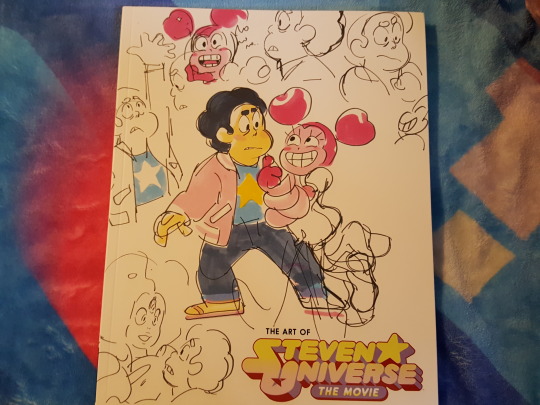
Nuts and bolts: The book is published by Dark Horse, and it was designed by Ryan Sands (a zine specialist), with commentary by Takafumi Hori, Kat Morris, and Rebecca Sugar. It includes art by Rebecca Sugar, Kat Morris, Takafumi Hori, Alonso Ramirez Ramos, Angie Wang, Ashley Fisher, Becky Dreistadt, Chromosphere, Danny Cragg, Elle Michalka, Hilary Florido, Ian Jones-Quartey, Jasmin Lai, Jeff Liu, Joe Johnston, Julian De Perio, Katie Mitroff, Leonard Hung, Miki Brewster, Patrick Bryson, and Paul Villeco.
Full review below with low-quality images.
[SU Book and Comic Reviews]
An introduction explains the same origin story that Rebecca Sugar told us in the movie DVD's commentary: that she accidentally restored her phone to factory settings and lost years of important stuff, and she ended up applying that devastating premise to her movie. That combined with the concept of "breaking" the main premise of a TV show to make a movie was how she got started developing the story. The opening of the movie styled like a storybook is blocked out with some great drawings and breakdowns of which narration would go to what storybook pages. This is combined with some partial sheet music for "The Tale of Steven." Rebecca writes about how she felt having to wrap pre-production on Season 5 only to take on this even bigger movie challenge. The biggest challenge was writing all these songs in such a short time--six weeks--and having to deal with the stress, being crushed under all that pressure while still wanting to do this story so badly, and it was humbling to still have to work so hard to sell the idea. The feeling of relief to finally be done that Steven expresses in "Happily Ever After" is very similar to what Rebecca went through feeling like she wanted to be finally done but still knowing what she had to do to climb an even bigger mountain. Some very cute Steven-at-age-16 and Connie in Space Camp clothes follow. Notes indicate that Steven and Connie are the same height now, but his poofy hair is just slightly higher than her head.


Notes from 2017 also give us the "Neckstravaganza": design notes on Steven's new form, with a neck and a jacket. It's very cool.
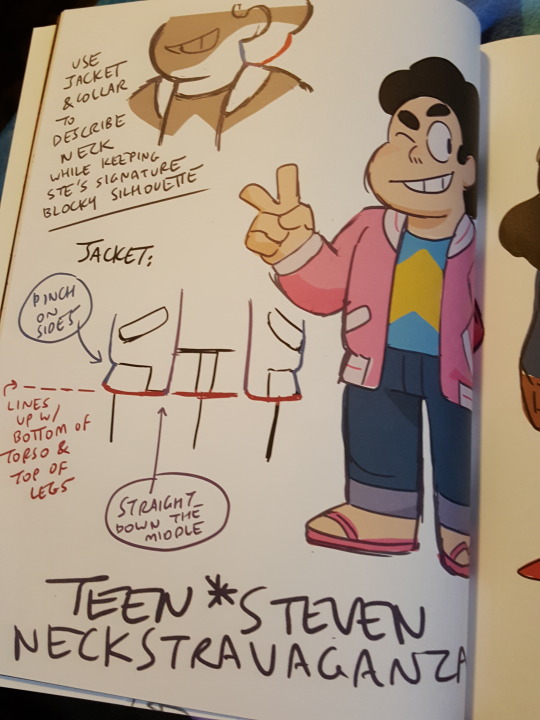
Some beautiful Joe Johnston boards follow, with sequences from the "Happily Ever After" song. We also get Angie Wang's final design (with Ashley Fisher's color) of the injector, including some sketchy concept art for it from Rebecca Sugar and Hilary Florido. In the rough concept notes, they call this the "Mega Injector," with notes for Takafumi Hori to use for scale. It looks beyond huge in a Leonard Hung drawing.
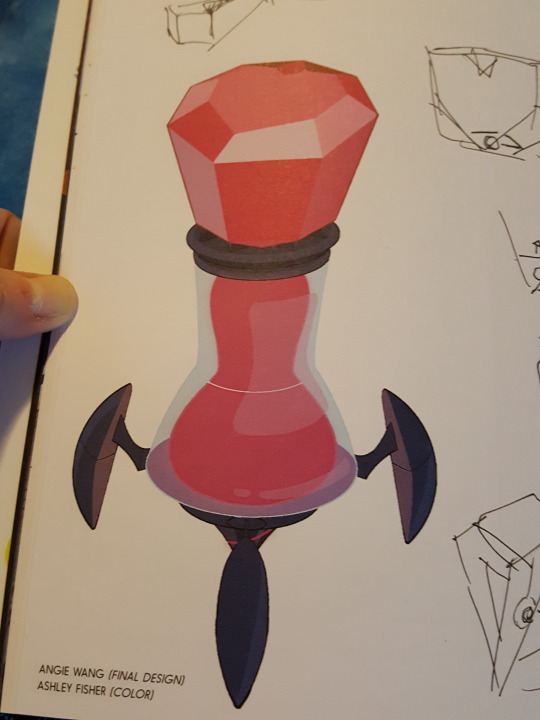

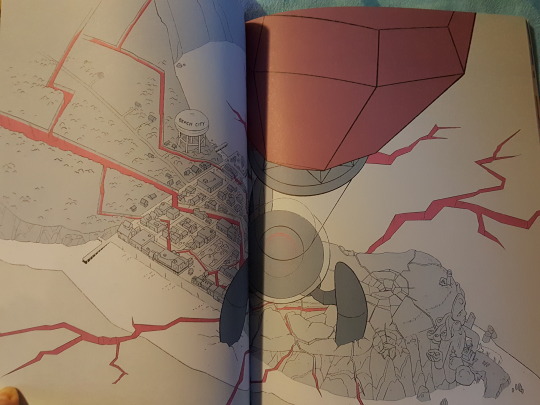
Spinel concepts are next. Some notes explain that aivi & surasshu (the usual composers) were involved very early since it was a musical, and Rebecca included them when pitching the story to the Crew so they could organically develop the sound. The heart shape was central to Spinel from the beginning, and early versions of her had an entire heart shape to her head.
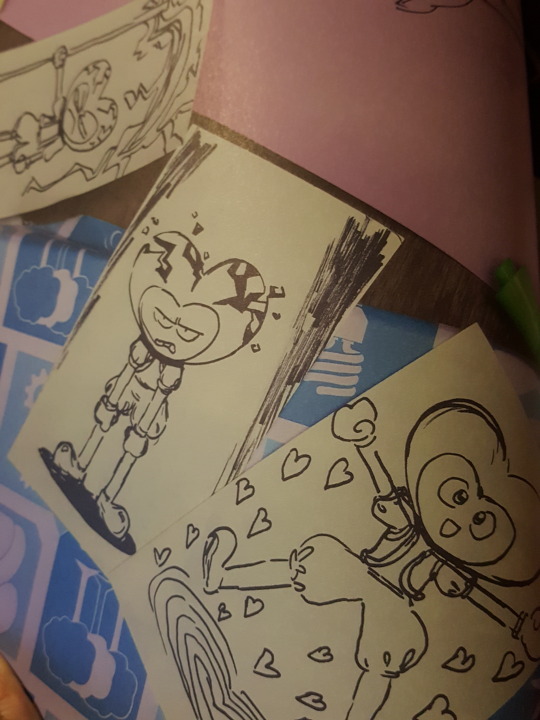
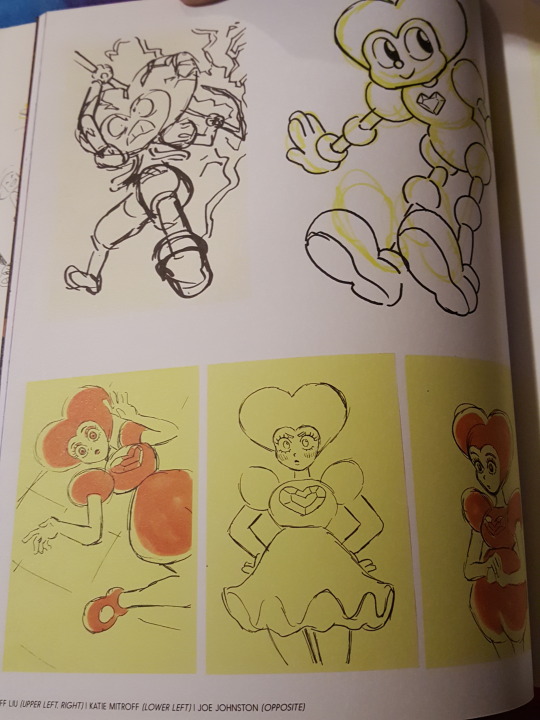
(There's a doodle of what looks like a cartoon dog in the pile of drawings shown in this section. It's not clear what that was.)
Spinel was given the heart imagery partly because Rebecca had learned early on about the importance of symbols, and when it came time to assign one to Steven, the star was chosen because it's so positive and is read as gender-neutral. Rebecca still hadn't used hearts for anything, so it was time. They also incorporated really old, dated character design ideas to make Spinel feel like an outdated cartoon from the rubber hose era.
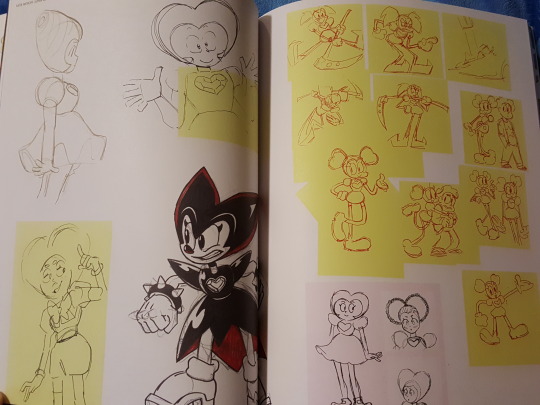
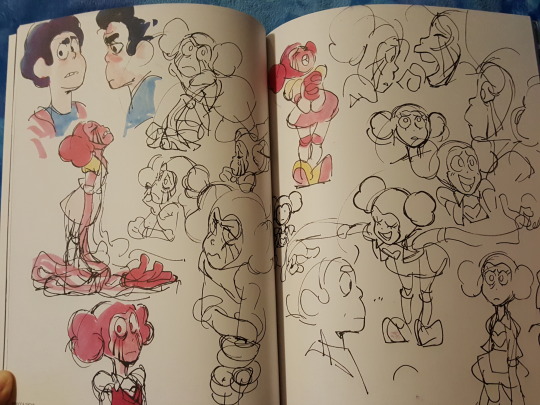
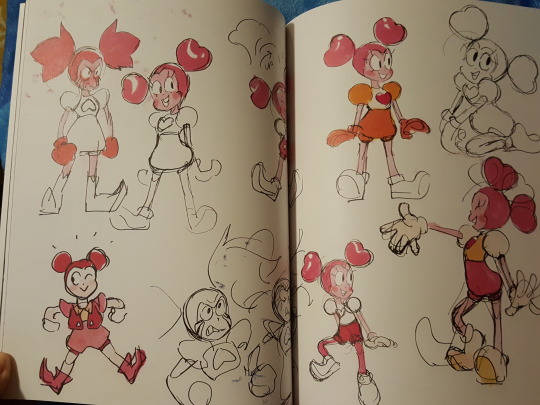

The aspect of her design with the running mascara versus cute eyelashes predated the rotation of her Gem. Rebecca likes to start with more realistic sketches when she's figuring out a character, and then she'll move to making it more cartoony. A quote from Miki Brewster is shared: "Spinel can do anything, as long as it's entertaining!" Her "best friend" form is described as "a doll for friendship fun & games! Of a different era--hokey, charming, weird...super gullible and trusting. Incredibly loyal, constant entertainment machine!"
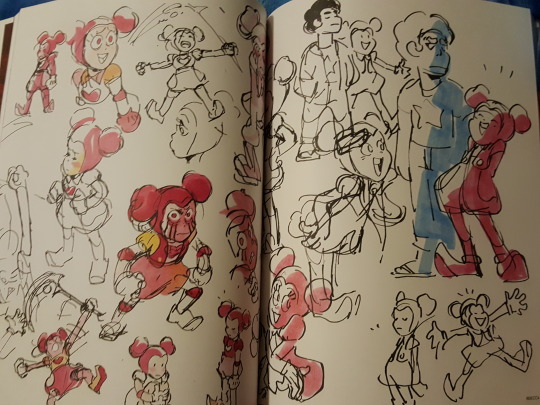
When it comes to developing her "worst enemy" form, Rebecca explains a bit that she has a really complicated relationship with old cartoons because nostalgia is not compelling to her--the animation from the 1930s is so neat, but considering the social limits and the way the industry was at the time, Rebecca doesn't think she could have participated. Especially considering nowadays she even had to struggle to be allowed to tell the stories she needed to tell and it would have been impossible five years ago. The norms of the time aren't entirely extricable from the art itself.
Takafumi Hori weighs in with commentary on how fun it was to animate a scary but fun character on top of Miki Brewster's boards for the "Other Friends" fight sequence.
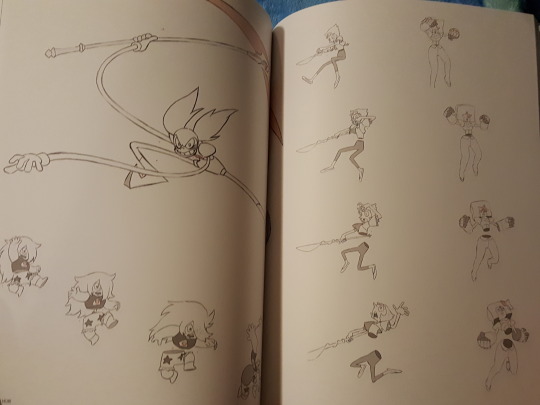
Next, moving on from the central new character, they also spend some time discussing Steg. Rebecca first explains "Steg Multiverse" as a character so uplifting he can make you fly, combining Greg's unending support and Steven's positive power. She makes reference to the early "stegosaurus" concepts they had for his look, but they didn't want to lose the opportunity to have his hair flow. Rebecca confirms that the pompadour idea was established in "Steven and the Stevens" so they wanted to give it to Steg, and she credits Paul Villeco for really finalizing his design and bringing him to life.
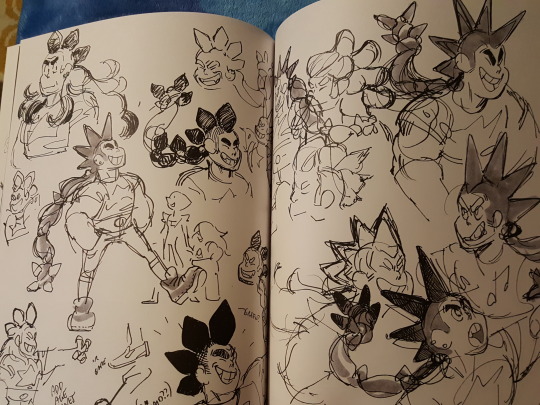
And of course the poofy hair from Steven and the double-necked guitar was essential for Steg.
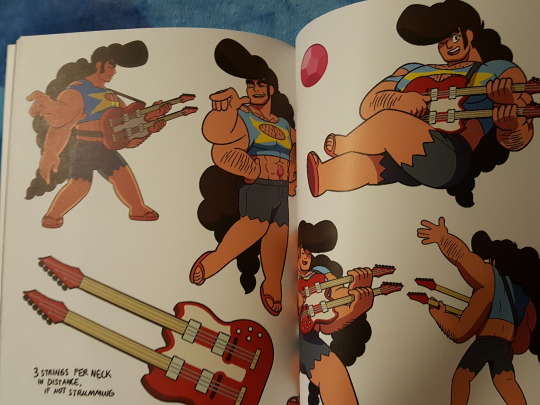
Next, the book gives us a whole page of handwritten notes about "Drift Away." Kat Morris explains the intentional duality of the scene--how Spinel should be shown seeing her own past with new perspective, being embarrassed, blending together who she was with who she is. The partial lyrics to the song and some sketchy boards are offered.
Rebecca shares her personal connection with the subject matter--how she once left a stuffed animal in her garden and the side facing the sun faded. It really made a mark on her as a child that things changed without her, because of her actions, and that she'd left this treasured toy alone without thinking about it all that time, letting it be affected by the elements without her interference. She wrote "Everything Stays" for Adventure Time based on that plushie, and realized that she was writing about it again for the Steven Universe movie.
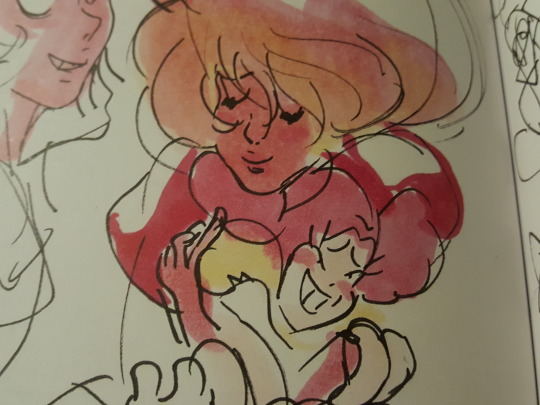
Many beautiful miniature boards are shown in this section.
Partial sheet music for "Drift Away" is also offered here. It's credited to Rebecca Sugar and Aimee Mann. The music sheet is followed by some lovely images of the garden by Julian De Perio, Patrick Bryson, and Leonard Hung.

Takafumi Hori returns for a discussion of the final fight sequence during "Change," which he animated from Jeff Liu's boards. He discusses trying to keep the fight feeling dramatic and serious even though Spinel's fighting style is funny. He wanted to keep her tension. Hori-san throws in a word of thanks for being allowed to work on his favorite show again, praises Jeff and Miki, and compliments Rebecca Sugar's demos. He hoped we'd get a soundtrack album. (Of course, we did.)

Some final boards by Rebecca Sugar and Becky Dreistadt of the characters in their show gear descending the steps close out the book. There are also some cute little doodles at the end on the credits page, like a head of lettuce with caption "lettuce adore you" and Spinel in a drifting go-kart laughing, captioned "drift away."
The back cover pictures Steven with his arm around a heartbroken Spinel, comforting her.
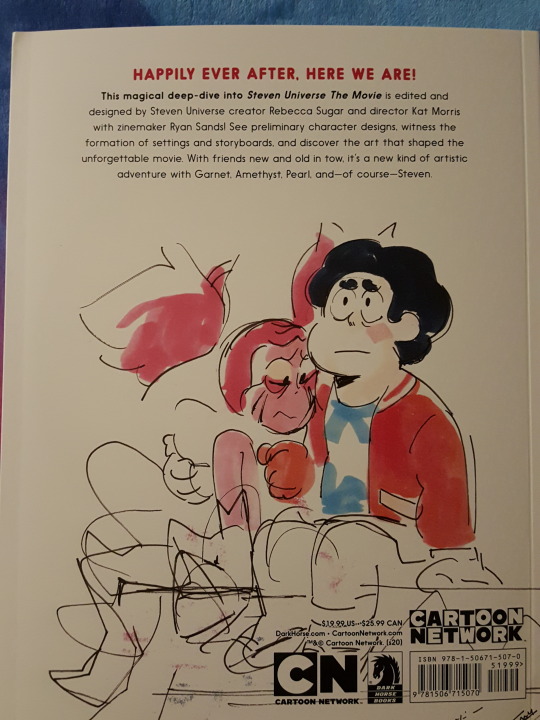
Overall, the book is wonderful--the accompanying information is generally not new to anyone who watched the DVD's documentary and commentary, and many of the sketches have been released one way or another directly by the artists through Instagram, Twitter, or Tumblr blogs. There was still plenty of wonderful new concept art that wasn't already out there, and looking at some of the iterations Spinel and Steg went through was particularly captivating. There was no new insight into the development of the plot beyond the premise and the Spinel-related conflict, though; nothing about how they decided to focus the Garnet storyline, the Pearl storyline, and the Amethyst storyline for how they would each get their memories back, and there was no spotlight on their movie versions--modern Cotton Candy Garnet, copycat baby Amethyst, and factory settings uncustomized Pearl. I was hoping especially for some Amethyst stuff because the movie was the first place we got to see her with the simple default outfit and segmented limbs. It was primarily an art book with commentary on some of the most definitive movie aspects--it didn't reach the depth that Art and Origins gave us. It has a start-to-finish feeling in a sense, but it's mostly just splashes of information that are fun to know. It's a great companion and definitely should not be missed by any fan of the movie. I recommend it heartily!
[SU Book and Comic Reviews]
#steven universe#steven universe the movie#the art of steven universe the movie#movie art book#myblog
148 notes
·
View notes
Text
Miss Americana Is A Coming-Of-Age Story, Says Director Lana Wilson
By: Madeline Roth for MTV Date: February 12th 2020
Miss Americana, which premiered last month at Sundance and is now on Netflix, charts the pop star's transformation from a people-pleaser who measured her worth in pats on the head to a 30-year-old woman who's stopped worrying and learned to speak her mind. Wilson told MTV News about the doc:
"When I started, there wasn't a set, 'This is the story,' or anything like that. I just started filming immediately after meeting her and then just filmed, filmed, filmed, and saw what emerged."
Wilson tells MTV News about how Miss Americana is a coming-of-age story, the delicate balance of portraying Swift's romantic relationship, the studio footage she left on the cutting room floor, and the now-infamous "cat backpack."
This film made me really excited to see what kind of artist Taylor Swift is going to be in her 30s, now that she's seemingly more comfortable speaking her mind and isn't as worried about being a quote-unquote "good girl." Do you see it as capturing a turning point in her life? Absolutely. I think it's a coming-of-age story about this woman at a pivot point in her life and career. Taylor went through all of this pain and then stood up and became the person she wanted to be, but didn't have the ability to be for so many years, because of the leash that she put on herself. To be able to take that leash off, I think it's really amazing for people to see that. It's amazing from a documentary director's perspective when you get to go with a subject who really changes in the time that you film with them. That's what I was lucky enough to get to see.
You do get that sense that she doesn't feel the need to constantly reinvent herself anymore. How do you think the film sets a tone or an expectation for her going forward? I think she's always going to artistically challenge herself no matter what. What I saw when I saw her writing songs, and even from the videos of her when she's 11 years old writing her first songs on the guitar, is that she's someone who is always going to write something she hasn't written about before and do something new and experiment. I do think she's more comfortable with who she is now, though. It's about her journey to self-acceptance. She's less focused on being the person other people want her to be and more focused on being the person who she wants to be and who she is.
You definitely saw that throughout the film. At the same time, I loved seeing those moments where she's insecure, like when she finds out that Reputation didn't get nominated for a Grammy or when she's criticizing the way her face looks while shooting the "ME!" video. She even says at one point that she feels like there's a better version of herself out there. Why do you think those moments are important to see as well? I think when you see any insecurity coming out of the mouth of a superstar, that's a really powerful thing. And in fact, how we deal with insecurity is really what defines our strength. Taylor writes so candidly in her lyrics about the hardest times and the times when things didn't go well. That's what her fans love her for. We all want to feel less alone, and that's one reason why people turn to art. It's great for people to see that their heroes are human.
I found it really effective how her ages showed up on screen throughout the film. It really made you realize that she was so young when all of these big, formative life events were happening to her. Why did you decide to highlight her ages like that? That was my editor Greg O'Toole's idea, and I thought it was brilliant. It changes the way you see everything. When we think about Taylor Swift, I think we tend to forget how young she was when she started. You feel that amazement of, "Wow! She was writing those songs at that age?!" But then there's also, "Oh my god, she had to go through that when she was a teenager?!" You see the good things and the hard things at once. It gives context, but it’s also this reminder throughout the film that this is a coming-of-age story.
Totally. When it came to portraying Taylor’s relationship with her boyfriend, that three or so minutes where he's shown backstage and then you see cell phone footage that looks like it was shot by him — I found that particularly moving and a nice way to acknowledge something that is an important part of her life but is also sacred and private. What kind of care went into achieving that balance? It really was a balance. Taylor's had so many relationships go through the public ringer, so it was important to respect her desire to keep her relationship private, while still acknowledging the important role that relationship plays in her life. I remember we had done the first rough cut and we had this whole section of her writing Reputation. She was like, "I do have a few videos on my phone that I think could capture the fact that while I was out of the public eye, it was one of the happiest times of my life." When I saw those videos, I was so moved by them. Especially by her singing "Call It What You Want" when she's in the slippers. I was like, "This is everything. This is all we need to know." It's really special. You don't even have to see her boyfriend's face; you could feel it.
I loved that scene and I loved the song choices in general. "Out Of the Woods," "Getaway Car," "Call It What You Want"... I thought it was really cool how you didn't just use "Shake It Off" and all the big hits. I so appreciate you saying that because not a lot of people have commented on that. I really did not want to do, "here's all of Taylor's greatest hits in the first 10 minutes of the movie," which you often see in this type of project. I wanted to use songs that were emotionally and thematically related to what was going on in the story at that time. With "Getaway Car," it's this moment of total freedom for her in the story of the film. Or "Clean," after the sexual assault trial, for example.
When you're making this kind of film and you're capturing Taylor during such a long stretch of time, how do you know when it's done? What was the moment when you realized you had enough of the story you wanted to tell? My sense was that we had to film through the Lover album release. I think you feel at that point in the film that Taylor isn't as concerned with what people will think of the album. It's more like, it was a joy for her to make and to put out into the world. She went through this period where she went away from the public eye, but she wants to keep entertaining people and making music, and nothing is going to stop her from that. I loved the idea of ending the movie with her walking onstage, and that idea of this bravery she's had since she was 12 years old, of walking out to perform. I wanted to end it with her going back out into the world again to face the public, but you have the sense that something's a little bit different about her now. That's the sense I hope the audience has.
Was there anything you had to leave out of the film that you were particularly bummed about cutting? There was so much more songwriting and recording in the studio. It's so special to see something come from just the seed of an idea - a fragment of a melody or a lyric typed in her phone - and get to then hear it as a finished song. That's some of my favorite stuff in the film, but there was a lot that we had to leave on the cutting room floor, heartbreakingly.
I'd imagine. Do you think that footage will ever be used for anything? I don't know. People have asked me about it, so it's giving me hope that maybe we could just release the 40-minute version of Taylor writing "Only the Young" as a standalone film or something.
Honestly, I would watch. A lot of people would watch! I think a lot of people would.
Last question: How long did it take for Meredith and Olivia to warm up to you? I don't know if they ever did, honestly! They're very cute and they're quite friendly. They're often hiding under things. They just kind of pop out from somewhere, so you do have this feeling of, "There are cats everywhere!"
I loved the screen time they got. Especially the cat backpack. I remember watching the cat backpack scene with one of my editors and I was like, "Is this too long? Are we spending too long on the cat backpack?" He looked at me and he was like, "Definitely not." And he was absolutely right.
#Lana Wilson#mtv#interview#Taylor Swift: Miss Americana#about taylor#taylor swift#tay & joe#songwriting
139 notes
·
View notes
Photo
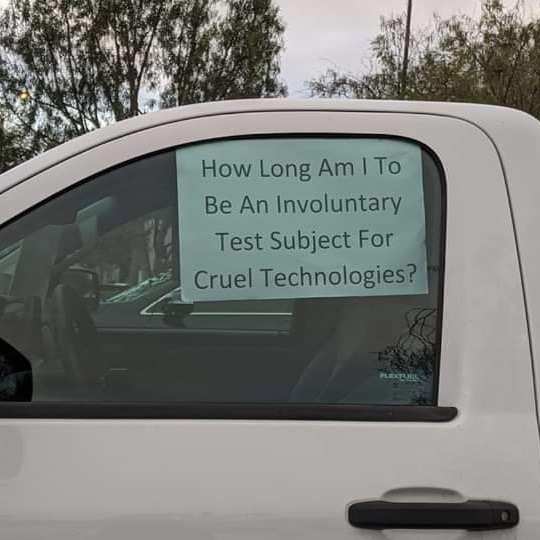
I have been unbelievably busy for all of 2020 so far. Starting a new job and crunching to finish an old one, it's been very good but it has also meant that I haven't had the downtime I'd have liked in order to write long screeds about when drums sound good in songs so my December and January playlists unfortunately never got finished. They will exist as 'lost' playlists in the grimelords canon where you will simply have to listen to them and have your own thoughts about the songs instead of having your judgement clouded by me saying things like 'this sounds nice' and 'I love when the guitar goes woo-eee'.
You can listen to them here:
December https://open.spotify.com/playlist/4crPEVSPwftPpWl14xUrXF
January https://open.spotify.com/playlist/25MP7onYLCwWRYBIi0u3yc
As far as this, my February playlist goes: It's great! It's two and a half hours. The songs sounds nice and the guitars go woo-eee. I was worried I wouldn't be able to listen to as much music with my new job but it turns out I'm listening to more than ever which is extremely nice. Please enjoy, and if you'd like to subscribe to this playlist please do so here: https://tinyletter.com/grimelords
Listen to this playlist here: https://open.spotify.com/playlist/3ZraEZOeS6qvVxfnz3AJS9
Ballad Of The Skeletons - Allen Ginsberg, Paul McCartney, Phillip Glass and Lenny Kaye: I had a dim childhood memory of this 1996 Hottest 100 funny skeleton song that my sister randomly brought up this month and was was shocked to find out that somewhere deep in my brain the part where the electric chair skeleton says “hey what’s cooking???” was still stored. I was also shocked to find out that the funny skeleton song I remembered from when I was a kid was actually a collaboration between Allen Ginsberg, Paul McCartney and Phillip Glass and was an unexpected hit on MTV and Triple J in 1996 for an as yet unknown reason.
I Can Go With You - Sam Burton: This song came up in my Discover Weekly, and I was so excited to listen to more of this 70s singer songwriter I've never heard of before who has no doubt had a long and illustrious career and was shocked to find out that not only is this song from 2020, it is also the first and so far only release by Sam Burton and his debut album is coming out sometime this year. I love how plain it is, and the first time I heard it it made no impression on me until a couple of hours later when I realised I was humming the melody to myself. It has this decepitive simplicity to it, and it sounds like a song you've always known which is really about as good a compliment as you can give a song. I also love this statement from him: “I was writing a song a day for 30 days as a personal challenge to myself. I Can Go With You came near of that practice and I considered it a throwaway at the time. After recording most of the album I still needed a couple more songs and decided to throw it on and we recorded it live followed by two others. When I listened back it ended up being one of the tracks I was happiest with on the record.” I love when artists are asked about songs and they have no divine inspiration to relate, just a process of daily work where they're like "well, I wrote it, like I always do. Did the chords and the words and everthing just like normal. I write hundreds of these things and this one came out pretty good. I don't know what else to tell you."
Wild Dogs - Colter Wall: This is a song by Billy Don Burns who you can probably expect to see on this playlist next month, and who as I understand it is one of these 'real' country guys that have been around for a million years and only ever had success when other people sang their songs. So it's very nice of Colter Wall to continue that tradition for him. I love the way this song takes the metaphor to a place of almost uncomfortable literalism, a tryst metamophising into something private, bloody and feral. The subtle way the lap steel whines slowly along in the background before stepping out and taking centre stage once the song picks up steam near the end is a marvel too.
Tom's Diner - Suzanne Vega: I had a live version of this randomly recommended to me by youtube https://www.youtube.com/watch?v=DkYPge6ZKSQ and it made me see this song that I'd always been sort of aware of in a new light and really properly appreciate it for the first time. Somehow I'd never noticed the last verse where it moves from literalism to memories, and of course that's sort of the moment that ties the whole song together. What I really appreciate about the acapella arrangement is that it feels like this is a song that's existed a million times before but she's the first person to actually write it down and record it. Everyone's made up a little dishwashing song or a little walking song, reciting some to-do list in your head. It's an entire genre that exists under people's breath for a few minutes and gets immediately forgotten.
If You Don't Know Now, You Never Will - Drugdealer: I could have sworn this was a Tobias Jesso Jr song. I really just assumed it was until I looked at the credits. It's such a nice song though and I'm glad this sort of 70s californian vibe is making a quiet comeback because it is just uniformly pleasant and it's nice to hear these sorts of arrangements, with the accenting violin runs and things like that. All the extra decorations and ornamentations that have sort of disappeared.
Crimson Tide - Destroyer: I absolutely love this new Destroyer album because it just feels like such pure uncut Destroyer. I’ve always thought of him as a sort of 400 year old vampire lounge singer who is just amusing himself at this point and so the cover art has really confirmed my suspicions on that front. The lyrics through this whole album are so good, the sort of stream of consciousness strangeness like ‘when lightning strikes twice the funeral goes completely insane’ that takes a on such gravity because he sings it with complete deadpan seriousness.
Truth (feat Alicia Keys and The Last Artful, Dodger) - Mark Ronson: I didn't really give this album a chance when it came out but ever since I found out Alicia Keys is good now (Time Machine) I've been looking for more good Alica Keys work and found one here. The Last Artful, Dodger is one of the worst artist names I think I've ever heard but she absolutely kills it on the way she says biiiiitch so I'll forgive it.
Surf & Turf - Boldy James + The Alchemist: Alchemist's production on this whole album is so incredible. He really just lets Boldy go and doesn't get in his way like good production should. Especially on the opening verse where Boldy James sticks with that loping flow for so long in 3s over 4 that matches that arpeggios in the beat, it's just a perfect harmony of rapper and producer.
Fat Mac - Duke Deuce: Misogyny in rap is a real issue that nobody seems really allowed to talk about because it's obviously very complicated, and this song some real classic 'stay in the kitchen' type woman hating in it and is basically incredibly callous and cruel throughout. However this beat is hot and there is also a part about a third of the way through where he says "fuck her till that pussy fart" and then makes a big fart noise, so.
Set It Up (feat. Trina) - Kamaiyah: I only found out about Kamaiyah's fantastic 2016 album A Good Night In The Ghetto about two weeks before her new one came out so I've been on a real Kamaiyah hype for a little while now. She's just fantastic. I love this song because I love the part where Trina seemingly out of the blue threatens to piss in my mouth. The first time I heard it I said 'wow!' out loud.
Come As You Are - Greg Phillinganes: There's something going on with the pop math in this song that I just can't put my finger on. It feels for all intents and purposes like this should be a hit. The melody is great. The big synth voice is great, it's got extremely fatty bass. It's great! But something about the structure of it is just off, it's got too many sections or something. Which kind of makes me love it more really.
Devotion - Pure Bathing Culture: What surprised me the most about this song is the secret shredding happening throughout. It feels like a sort of clean and cool guitar that hasn’t existed in the wild since the Lethal Weapon soundtrack and it adds such an energy to this already completely wonderful song.
Paper Cup - Real Estate + Sylvan Esso: The production on this song is just so beautiful. The violin melody and the pillow soft synths really add such an extra dimension to it. The tone on everything really. The guitar in the solo. Every time I listen to this song I just want to listen to it again because it goes down so smooth.
Mark Zuckerberg - Nap Eyes: I’m a very big fan of the way this song transitions from a sort of TMBG novelty song halfway through into a lonely and beautiful thing instead. It’s like he got distracted and wandered off in the middle of his set but the camera followed him. I also haven’t heard a lyric in a long time that made me bark laugh so instantly as “And what does he do with all that sand? He collects sand right? I think I read that somewhere. Seems innocent enough.”
Viking Hair - Dry Cleaning: I fell in love with this band immediately on hearing this song. The way the spoken lyrics sit in a place of almost coherence, dipping between mysterious phrases and earnest admissions feels like Life Without Buildings for a new generation. I love the feeling of a huge crush at the centre of this song that comes through achingy in every single word, even when she's talking about abandoned refrigerators.
LeBron James - Do Nothing: This is my number one song this month I think. I've listened to it every single day and I cannot wait to see what this band does once they've got more than a couple of songs out. It's my absolute favourite kind of lyrics: the kind that sounds like you just wrote down every one-sided phone conversation you overheard on the bus and then the music is some halfway point between Black Midi and Franz Ferdinand. What else do you need!
Can I Receive The Contact? - The Spirit Of The Beehive: The Spirit Of The Beehive's album is one of the best I heard this month. The way the production incorporates sound collage and samples without diluting the immediacy of the songwriting is really something special that feels hard to pull off in a rock context but sounds effortless through this whole album. The way this shifts at the end into the odd time section is so great and really the way the whole album flows like one long track is just amazing. Please listen, I'm obsessed.
An Air Conditioned Man - Rolling Blackouts Coastal Fever: There is so much space in Rolling Blackouts songs. They just go and go, sitting in this great jam space without feeling shaggy. The tempo across the album stays pretty consistently at this breezy, upbeat, driving speed that makes it feel like as soon as one song ends the next one just picks up exactly where it left off. It almost feels like a studio confines them and they'd be better off just recording their album live at a show where every song can go for 8 minutes like it wants to.
Leak -Truth, yesnoyesnoyes- - Boris: I got to see Boris and Merzbow this month, which was a great treat for me but it was also at a seated theatre venue which was a very strange choice. Sitting down and clapping politely as Merzbow pressed the screaming button feels odd, like being at an 1800s World's Fair show about the wonders of electricity or quite literally like being the guy in the chair getting blown away by the speakers in the Maxell ads. I bought earplugs for the show but ended up pulling them out for the last three songs or so to properly experience it, and it was fucking great. Something I was thinking about after the show is that it's interesting how Boris mostly have clean vocals, and really approach metal as an idea from and angle that's more shoegaze than Slayer. Aside from the immense volume, there isn't a lot about their music that I would describe as agressive, even most of what Merzbow added to the set was just extra feedback frequency noise, not atonal agression. I don't mean this in a trve kvlt way, more like it's interesting how they've taken the aesthetics of metal and refined them into pure amplifer worship, in their words, by either playing straight drone, or just playing normal hard rock at inhuman volumes. Boris are very good is what I'm saying, and I can't wait to listen to more of their extremely large discography.
Nameless Streets - Defeater: I've never really listened to much hardcore and I'm not really sure why. I've listened to Defeater's first two albums to death though so maybe it's time to branch out. What I love about this song, and this band in general is the vocal delivery. In a lot of agressive music from metal to screamo, because the agression and emotion is always sitting at a 10 the nuance can get lost and it becomes a sort of white noise, but Defeater have a nice way of backing off musically and vocally here and there to let the hard hits really hit hard. The outro to this song is also some absolutely world class snare work, building a tension bed in the simplest way thats relieved when the rest of the band comes crashing back in.
Boys In Town - Divinyls: I love the true desperation in this song. The trapped in a small town, surrounded by fuckers stress that gives way in the second half to just screaming "get me out of here!!". I am also interested in the evolution of the phrase 'too much, too young' and would like to know whether this song is referencing the song by The Specials, and if the Defeater song on this playlist is referencing this song or The Specials song, or if all three came up with it independently. It's a simply enough phrase, I suppose they could have. Who cares, really.
Body By Crystal - Spike Fuck: Come on a journey with me and imagine a world where Alex Cameron makes good music. That's Spike Fuck! The sort of burned out, past their prime singer desperate for a hit in any sense type of character - except actually put together with some heart and emotion and not an 80s comic book writer's understanding of human lows. I cannot wait to hear more from Spike Fuck.
Rogue Wave - Aesop Rock: It is something of a marvel how consistently high quality Aesop Rock's work is. For all his verbosity and expansive vocabulary he seems to never veer into white guy rap god flexing for the sake of it. Even a song like this that's 3 minutes of dense verses with nothing resembling a hook doesnt feel exhausting, it just feels like a series of extremely pleasing words and images like "take it where the warlocks lock horns, soda pop, popcorn / top notch gore set to Bach over fog horns" that makes my brain go "nice".
Momentary Bliss (feat. Slowthai and Slaves) - Gorillaz: I love the strange rollout Gorillaz are doing for this album, building the tracklist one song at a time. It's a nice way to force close listening, especially in songs with odd structures like this. I love hearing how different prouction changes Slowthai's approach; on this and Deal Wiv It that he did with Mura Masa it feels a lot brighter than anything on Nothing Great About Britain and there's a playfulness in his flow that comes through accordingly. Gorillaz are always moving around musically but I love how much of a live band feel this has compared to the more studioy sound that killed their last album for me.
We Will Always Love You (feat. Blood Orange) - The Avalanches: I am so excited at the possibility of a new Avalanches album already, and this is the perfect song to have as a lead single because it functions more like a teaser. Like 'would you like an hour more of this kind of beautiful, loving dream?'
Tar Sequence - Lalo Schifrin: I found out a little while ago that the local news theme when I was growing up was actually this song from the score to Cool Hand Luke, and according to a bunch of other guys in the youtube comments it was the local news theme for a lot of stations across America as well. The scene is of a prison road gang working under the blazing sun, and I'm sure someone could write a thinkpiece about the soundtrack to the nightly news, and really the platonic ideal of news themes in general stemming from the score to a scene about prison labour. But not me! I'm just going to write this little post and say we all owe Lalo Schifrin our lives for inventing the sonic pallette of kung fu AND the news, which is an incredible achievement whichever way you slice it.
When You - Tha Pope: It's a little bit of a shame that footwork is 'over' now but I suppose that's the way of things. The intro to this song is an absolute all timer for me. The delay soaked tag, the extended organ lick and then a total gear shift into this shrieking vocal sample that sounds like something has gone wrong but is revealed in actuality to be the centre of the whole track. I absolutely love Pope's little adlib at the start, and halfway through when he brings it back - it injects some real humanity into this cacophonous, volatile song and lets you know someone's done this on purpose, they've not just turned every dial to 10 and pressed play.
Jonny/Jonny (Reprise) - Faye Webster: I am absolutely in love with the tone of Faye Webster's voice and especially the way she slowly slides up to the note at the end of every line in the verse. This is a song that belongs to the great genre of songs that sound like they were entirely written and performed while laying on the floor and staring at the ceiling. The reprise here comes back at the end of the album and I love it so much. It feels like a Sex And The City monologue set to music, an underexplored genre I'd definitely like to hear more of.
Holes - Matt Berninger: Matt Berninger of The National covered Mercury Rev's Holes for a series of charity 7"s that Planned Parenthood are doingand I really love his take on it. It's a difficult song to cover because it is so beloved, and I think he does really well to not smooth out the arrangement into any sort of easy listening version. The rumbling piano and the extra vocals that mirror the original saw sound near the end are just wonderful. The part that always breaks my heart in this song is the "bands" line at the end and he really does it perfectly without being overdramatic.
Ta Aro - Nadia Reid: I love the way this song is just soaked in tension and potential energy. She has a beautiful way of holding a note just past the edge of her breath, like when she sings 'glory hallelujah' or 'I am stronger' and in the wordless refrain that just draws me in. Then the way it all closes in on itself and shadows close in at the end while it swells to this beautiful thunderstorm of sound. Just great.
Purify - Neurosis: Someone had a tweet a while ago that was like 'listen to a new album every day in February and write about it' and I thought 'fuck it why not' and started doing that. I kept a little note in my phone of every album I listened to that I'd never heard before, and I ranked them out of 5 so I could remember which ones I liked. I ended up listening to 49 new albums which surprised me, and it was surprisingly easy to do as well so I've decided to keep doing it in March as well. Highly recommended. A nice side effect of constantly searching for new things to listen to is it's given me a chance to hear bands that I've always heard about and know the name of but never actually listened to for one reason or another, which is how I got to Neurosis. It's nice to hear this kind of industrial 90s metal that I'd only ever previously heard in Tool from another angle, and it is especially nice to hear bagpipes in a drone metal context - a thought I'd had independently about a week before hearing this album and was glad to have willed into existence before me.
Shallow Sun - Real Estate: Time! I love a song about aging that mentions specific years and ages so you can count along on your fingers. '25 in 2010... so he was 24 when they put out in their first album.. 39 in 24.. so he's... 35 now.. and i'm 28... which means I'm... 3 albums behind..'
Quand Vas Tu Retrer - Melody's Echo Chamber: I'll listen to any song in 5/4. It is simply groovy. This song is so beautifully textured it feels like you can just get completely lost in the sound while the groove moves it along.
Living Through Another Cuba - XTC: I think I've posted this song on one of these playlists before but fuck it, the more time passes the more I think this might be one of the best songs ever written and a complete and total encapsulation of the cold war mood. The absolute maniac resigned powerlessnes on full display, screaming and shouting about pullings fins from an atom bomb and the absolute certainty that even if the world isn't destroyed this time it'll all come around again soon enough anyway.
Time - U.S. Girls: I am a huge proponent of the long song at the end of the record as a concept, and really I believe every song should be the long song at the end of the record if at all possible. This amount of colour in this jam is just incedible, it never gets weighed down or waylaid it just keeps moving though an ever shifting kaleidoscope and I absolutely love it. It also reminds me of Los Bitchos who were on one of my secret lost playlists from December so it's nice to have their vibe represented here at least. This song also interestingly ties into a thought I was having this week about the limits of music wherein time is the only immutable constant. In all of life music is an inescapable constant of course, but in music especially compared to visual art or written art, time is an inexorable force. You simply cannot bend time in music, a song or performance will always have a duration that will define it, short or long, which cannot be muted or played with in the same way that rhythm or tonality can. 4'33" is a good example of that, being devoid of everything except time. When there is nothing, there is still time. Canyons of time.
Bad Magic - Weyes Blood: I got to see Weyes Blood a couple of weeks ago and I feel extremely blessed that I did. She's just amazing. She played this song solo as her last encore, and she's in a sort of interesting position of blowing up majorly on her fourth album so people (myself included) weren't overly familiar with her older stuff. So when she said 'this is a song called Bad Magic' everyone clapped politely and one woman right up the back screamed "oh my GOD??" which is the kind of personal, just for her, singular experience I'm always here for. Hearing this song for the first time in that setting has really made me fall in love with it. The thing that's always alienated me a little abot Weyes Blood's earlier work, and the thing she changed so dramatically on Titanic Rising is the structuring of her songs. Titanic Rising embraces pop songwriting so wonderfully where her earlier work was so much shaggier and harder to access as a result - but in this song I love it. This song is meandering and long and wanders around in circles and I'm here for every second of it.
Listen to this playlist here: https://open.spotify.com/playlist/3ZraEZOeS6qvVxfnz3AJS9
96 notes
·
View notes